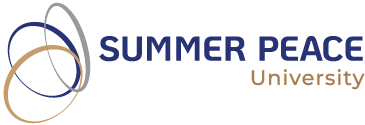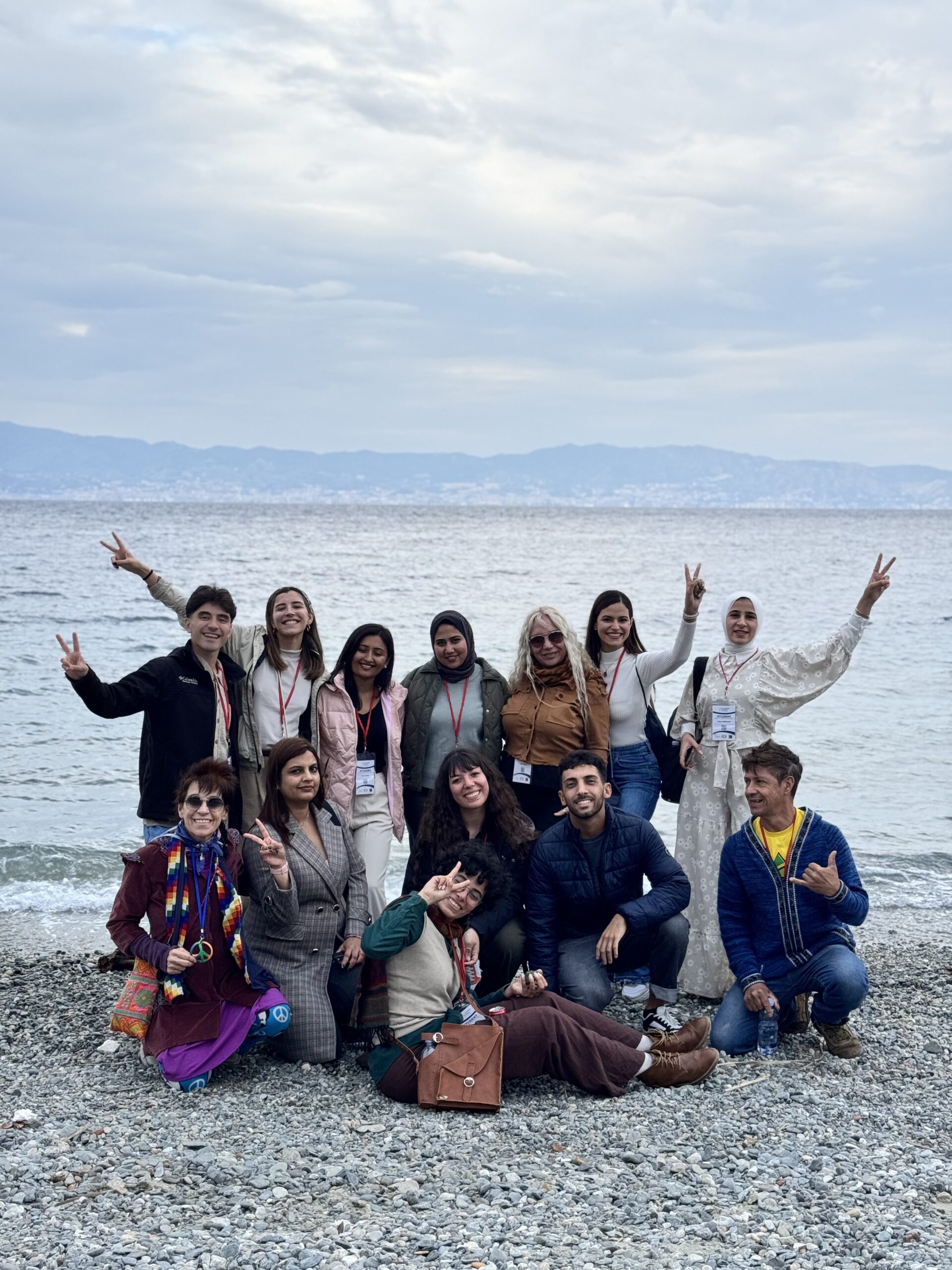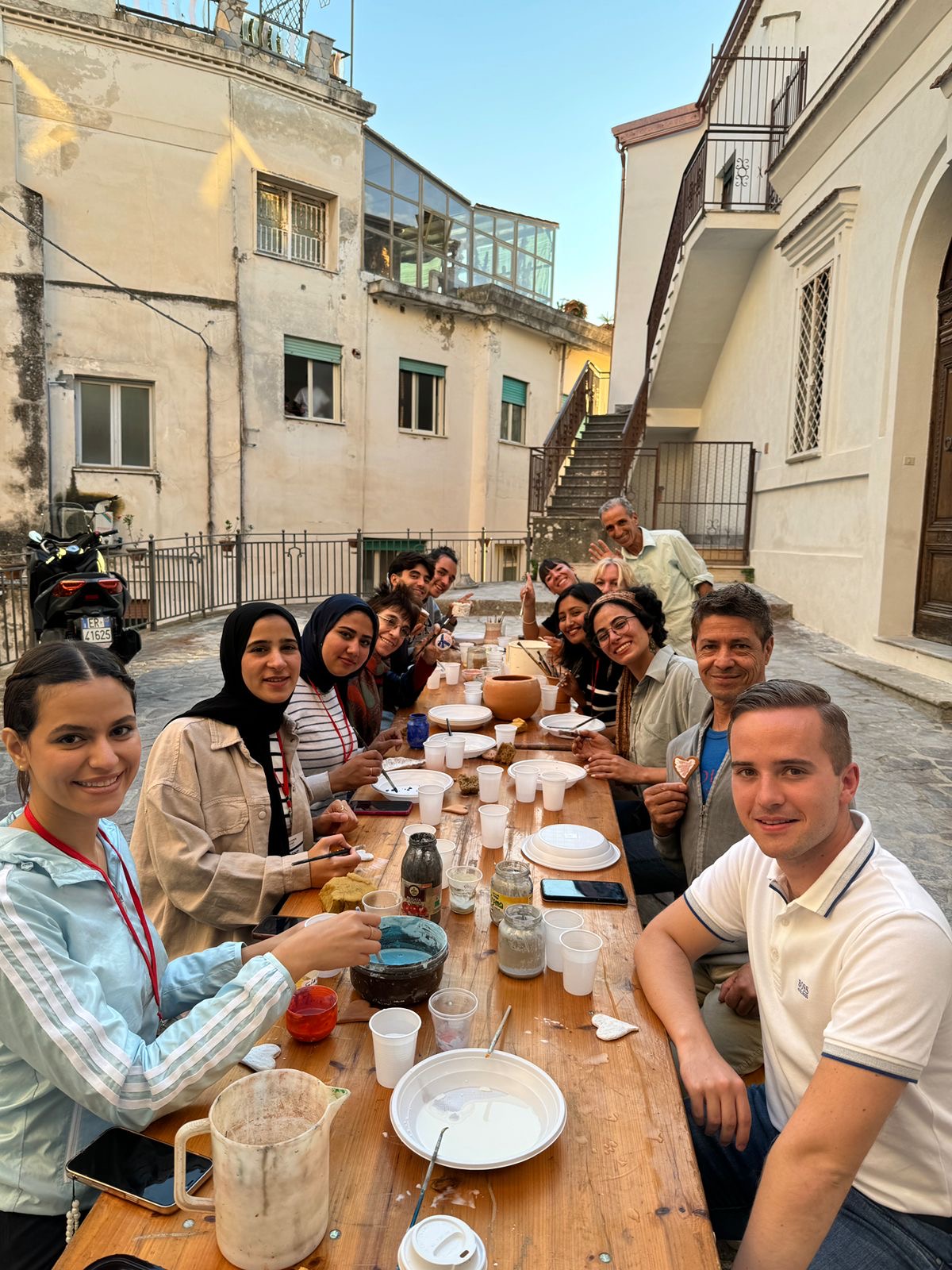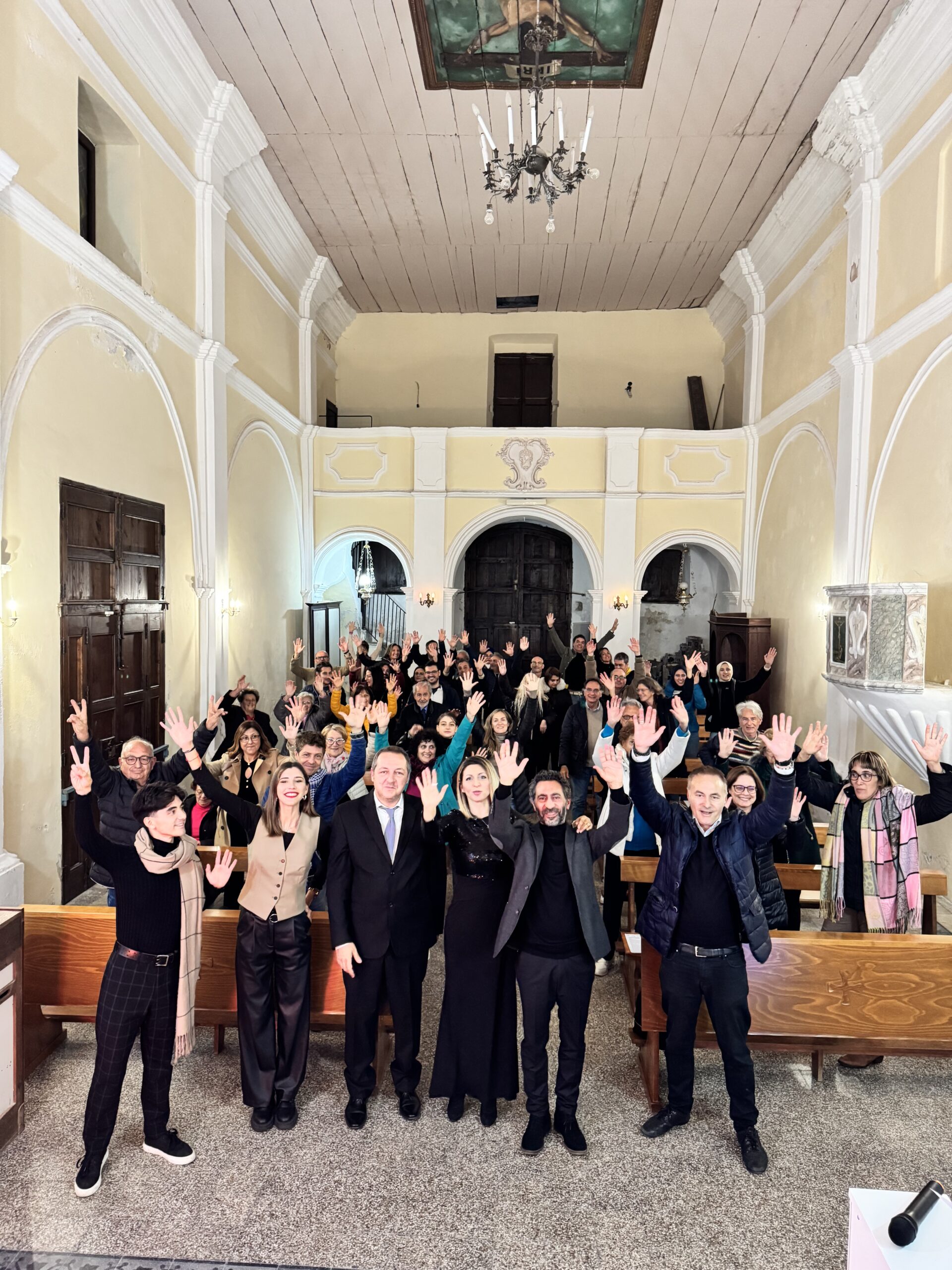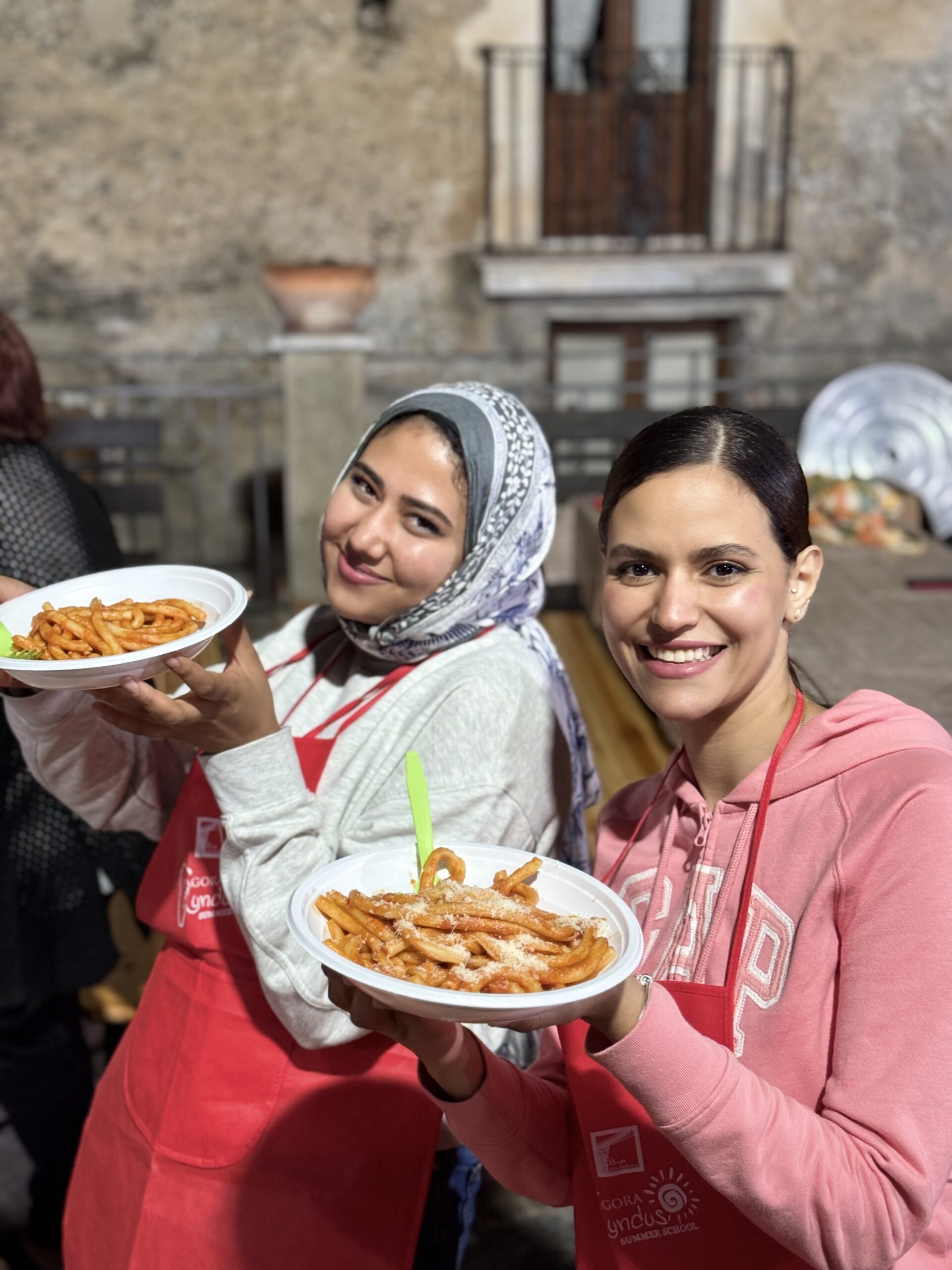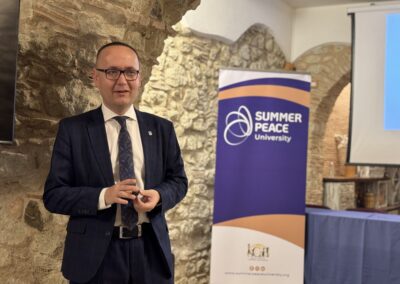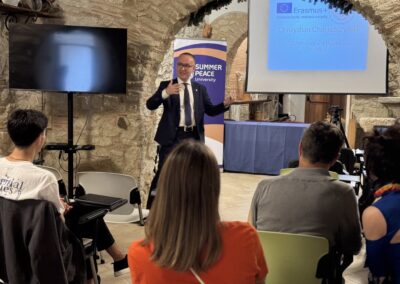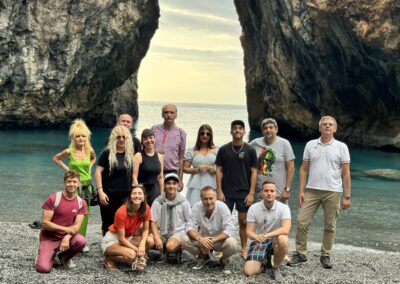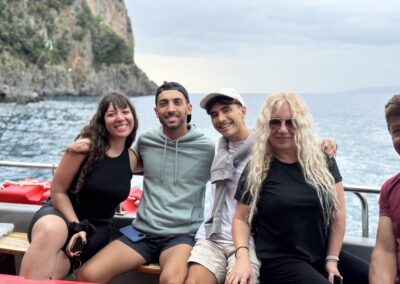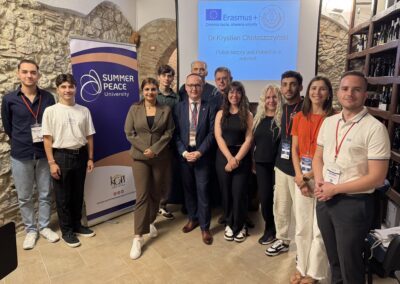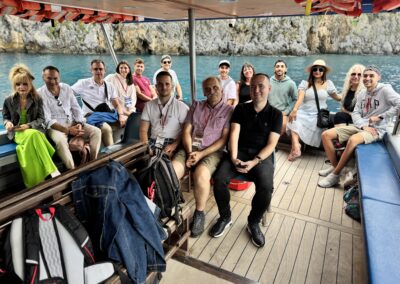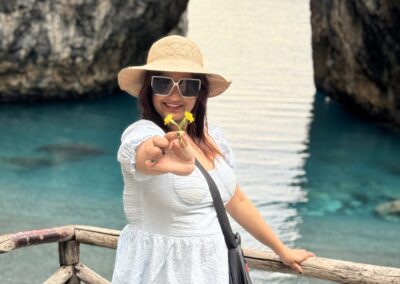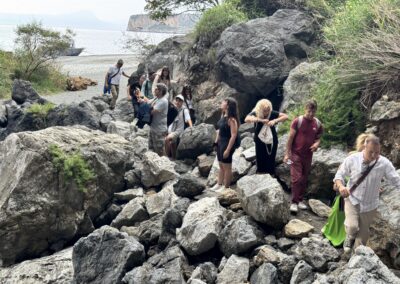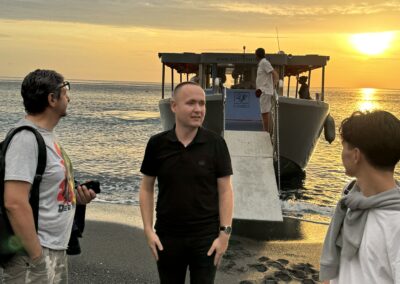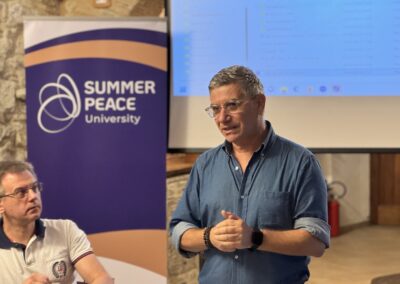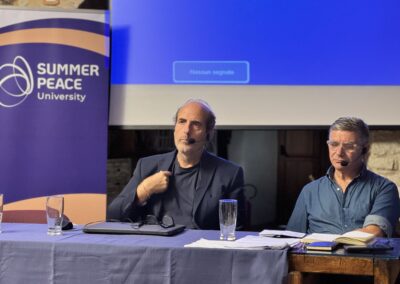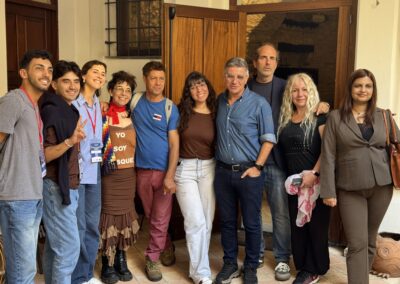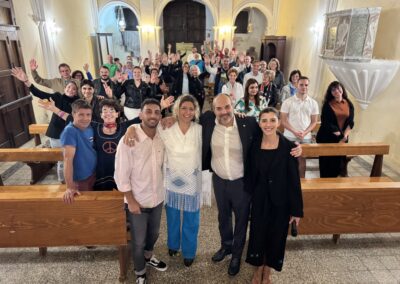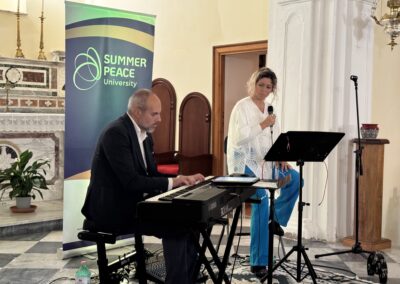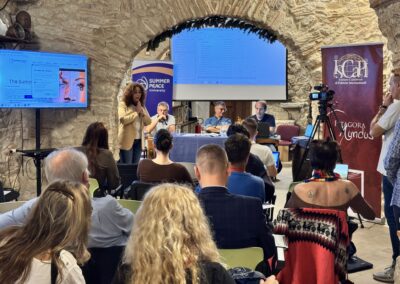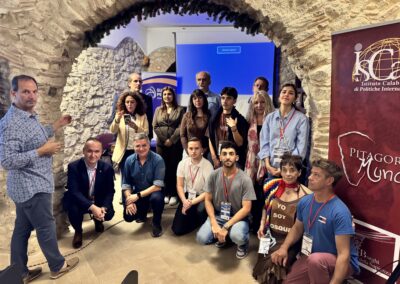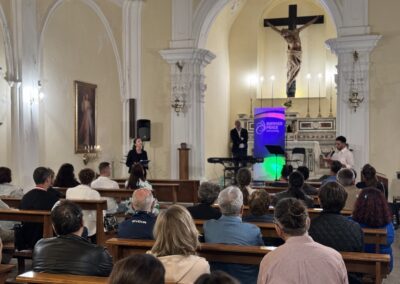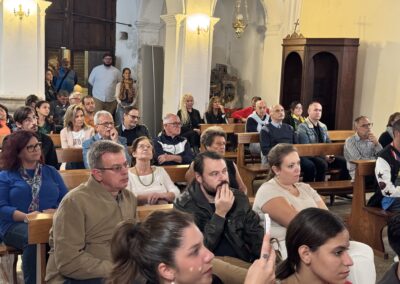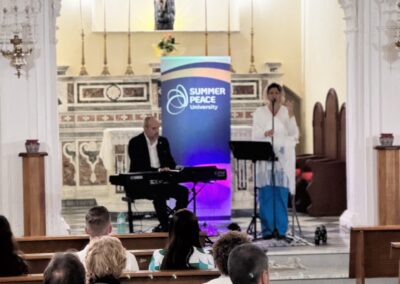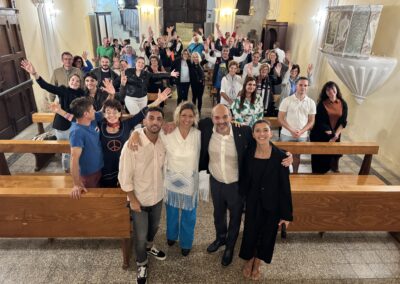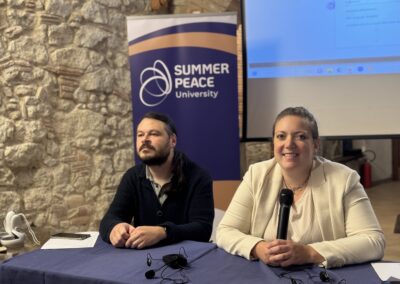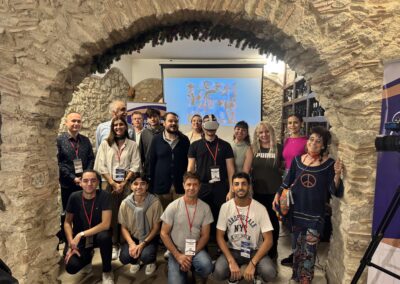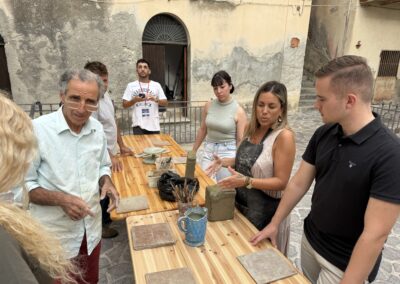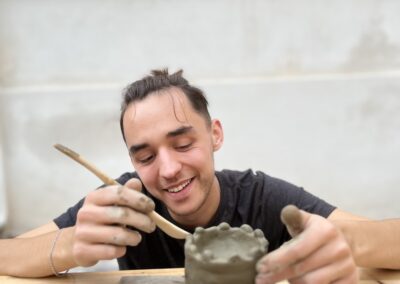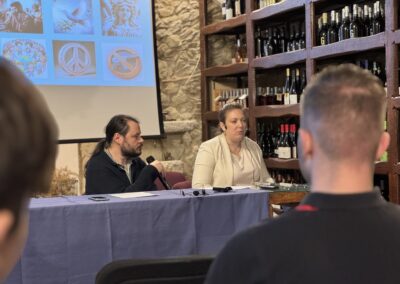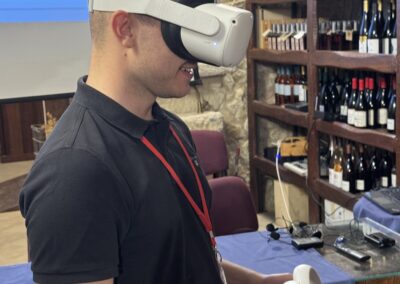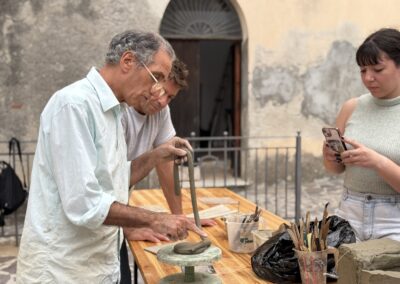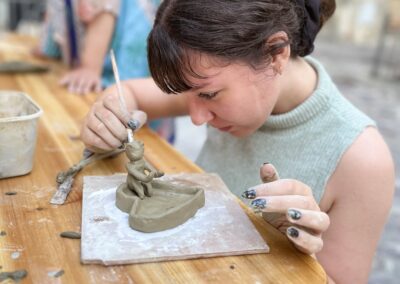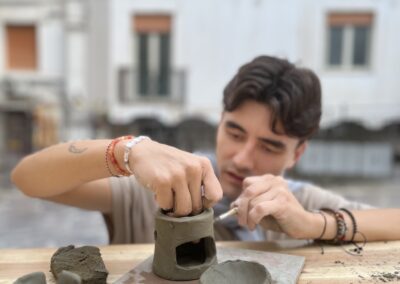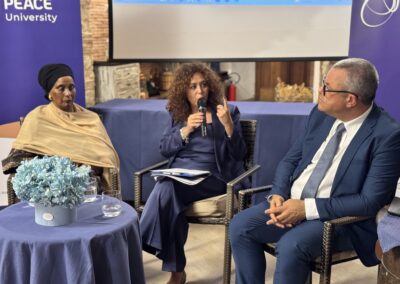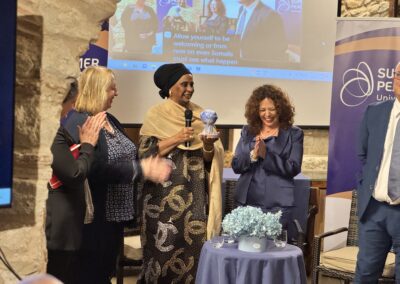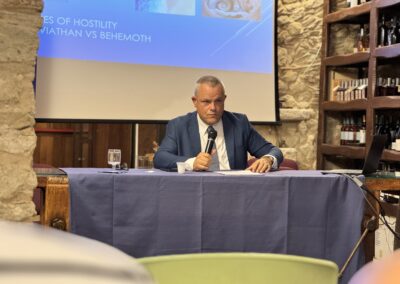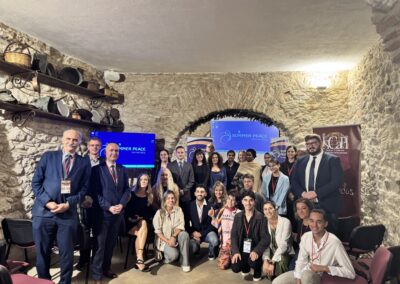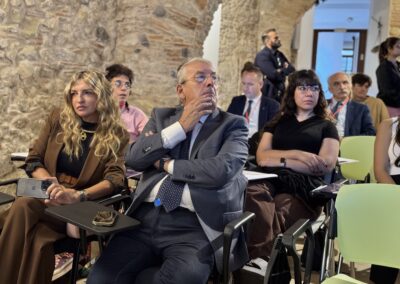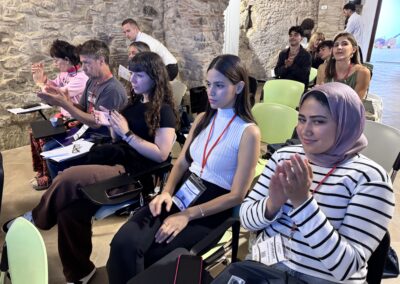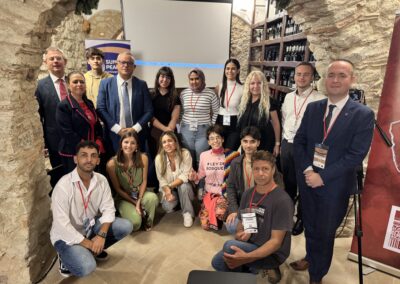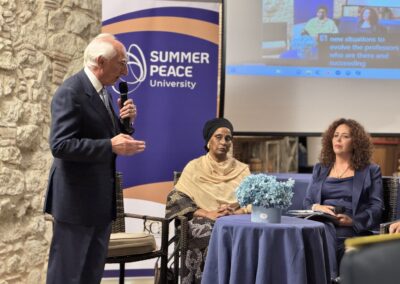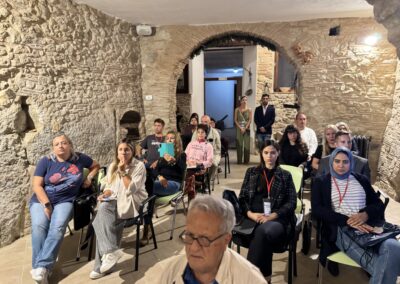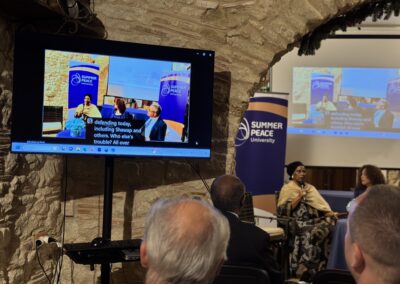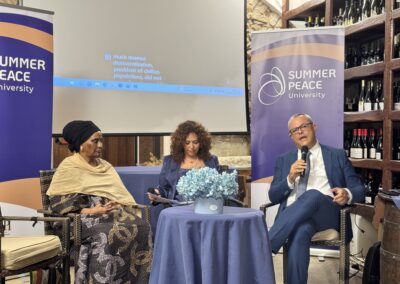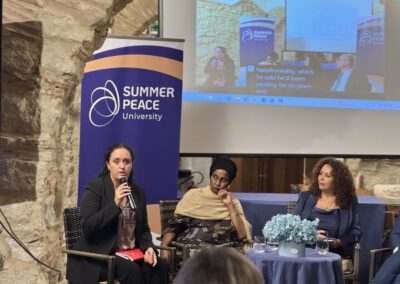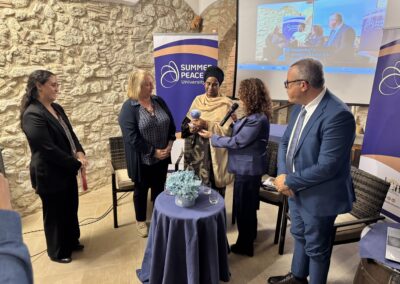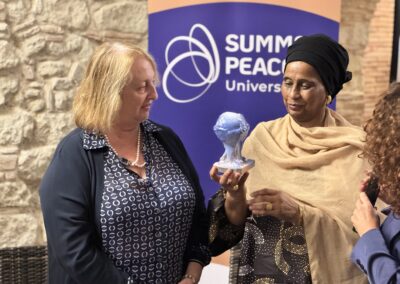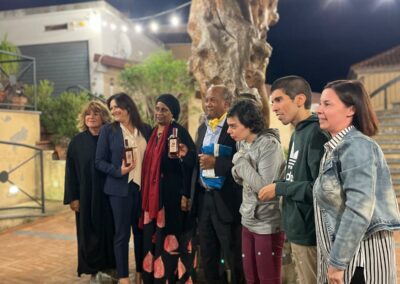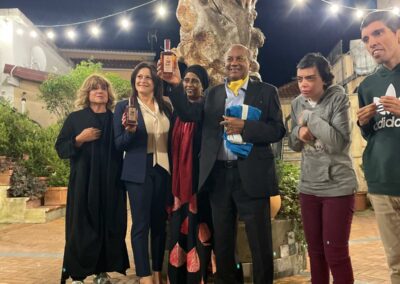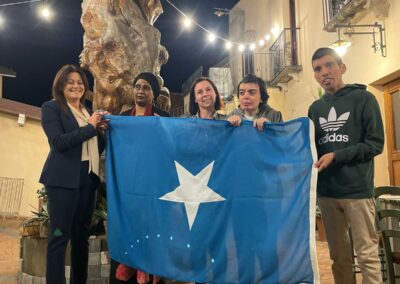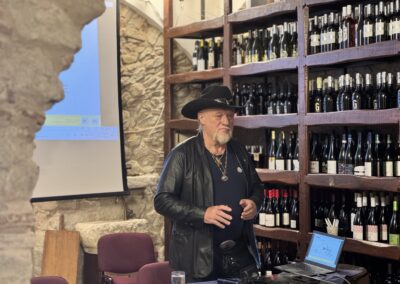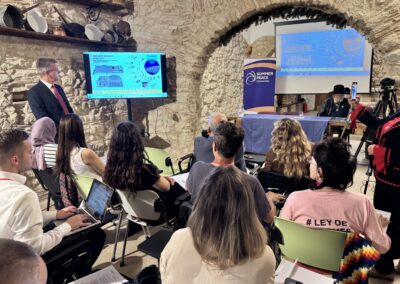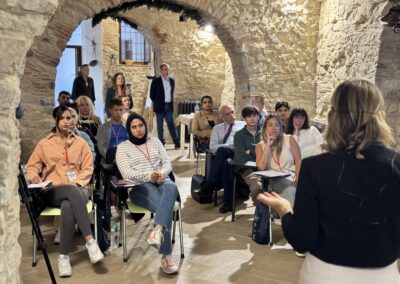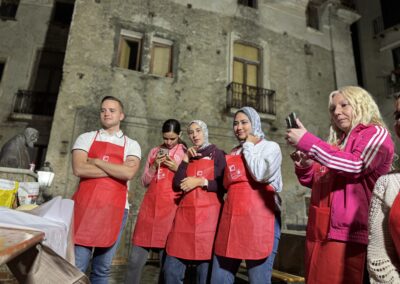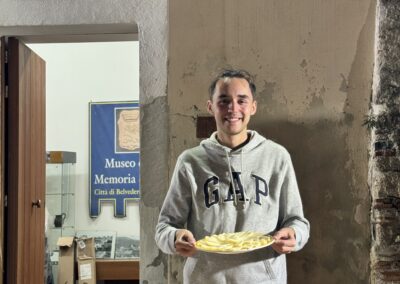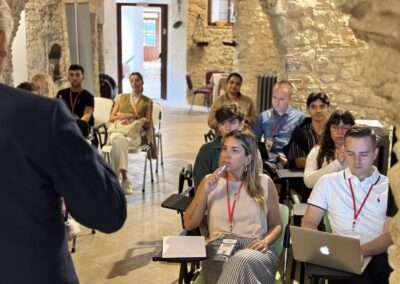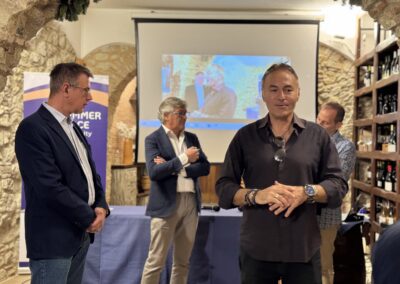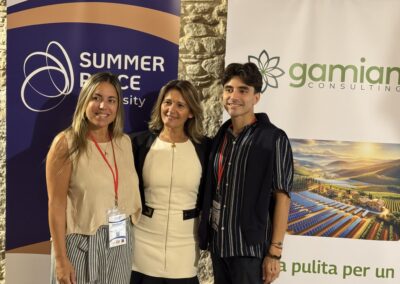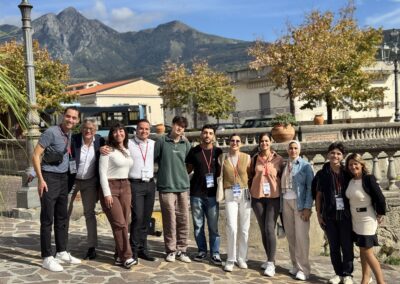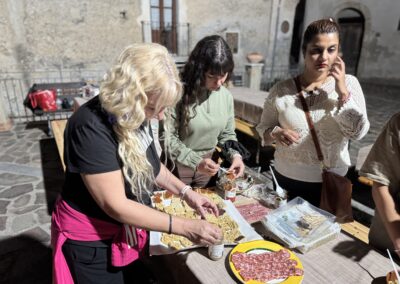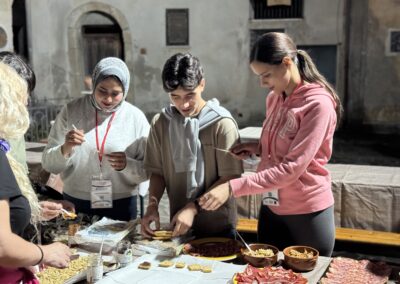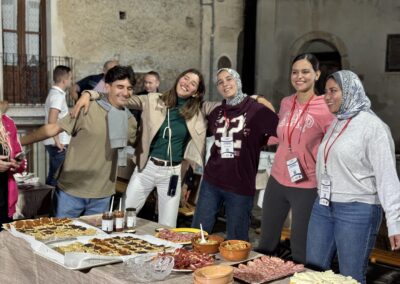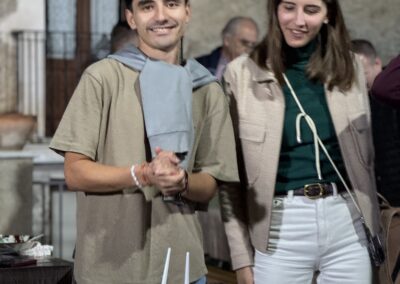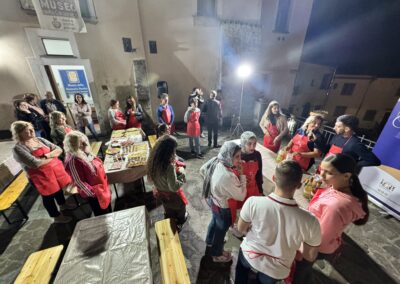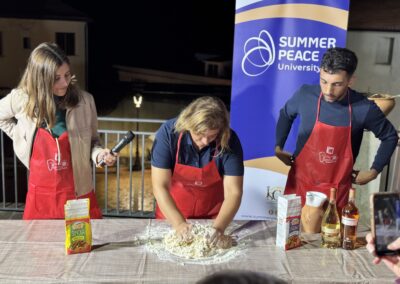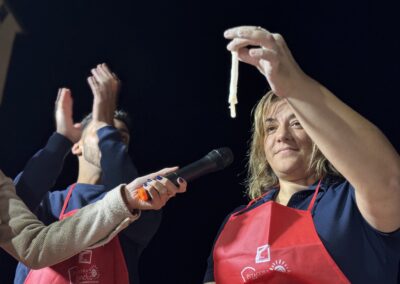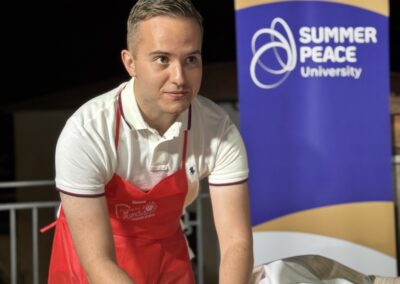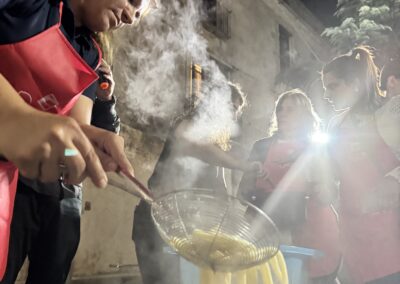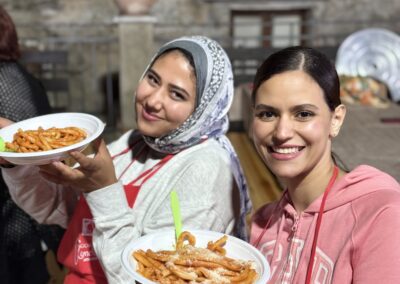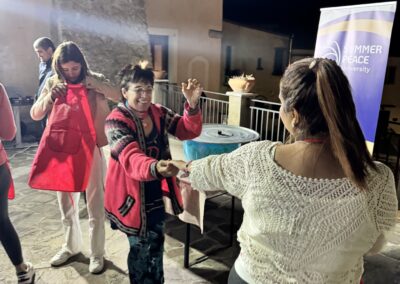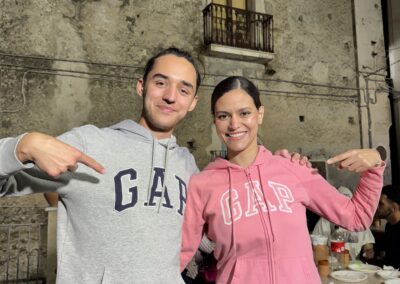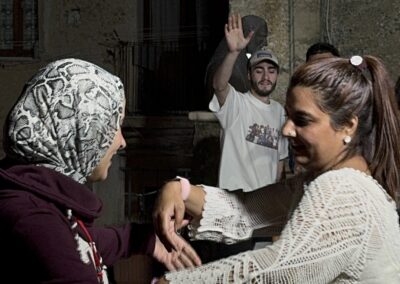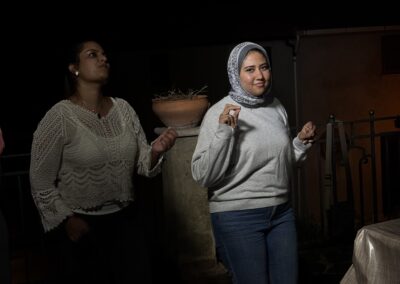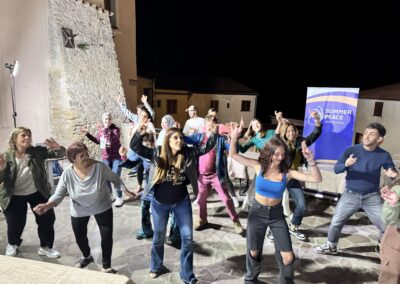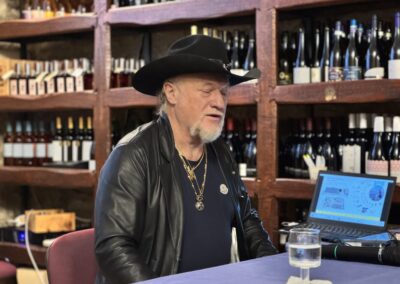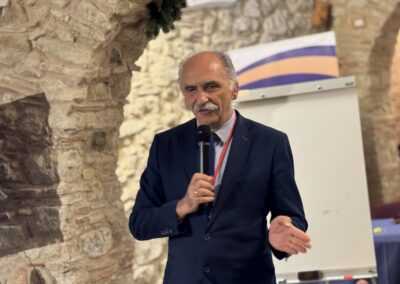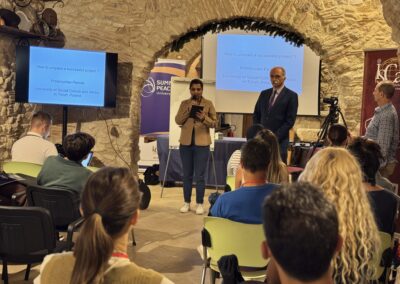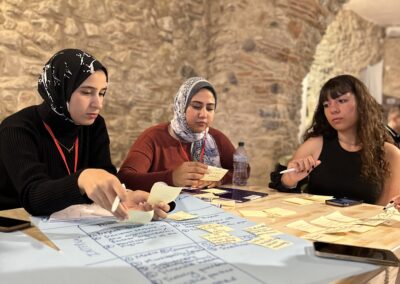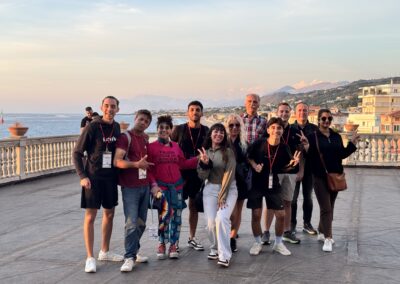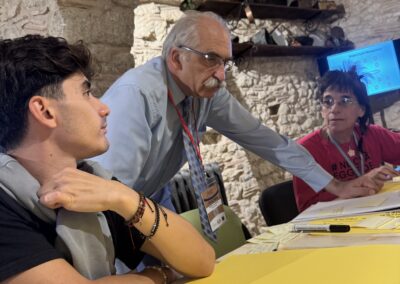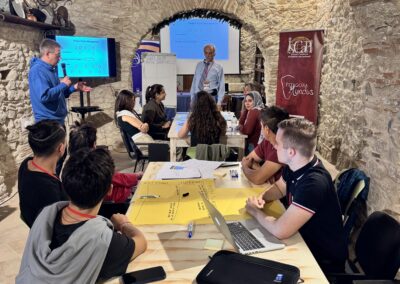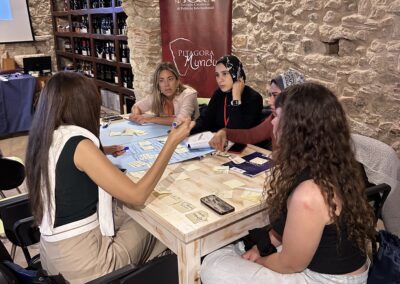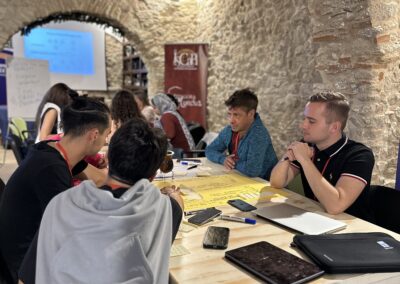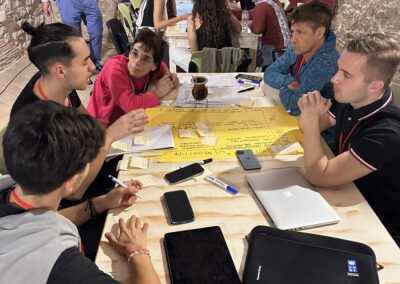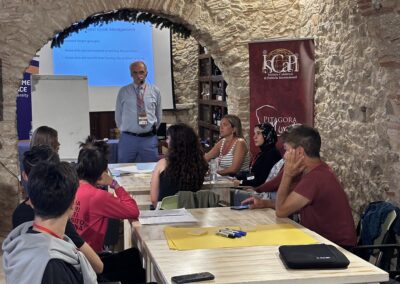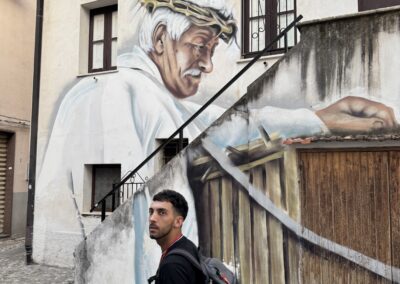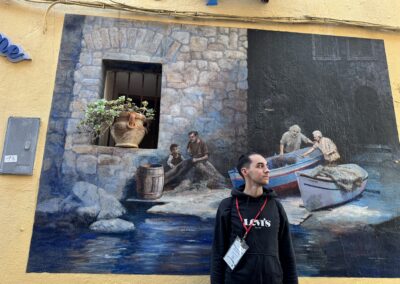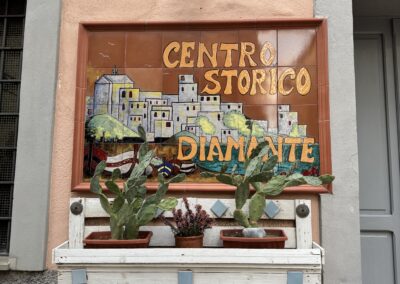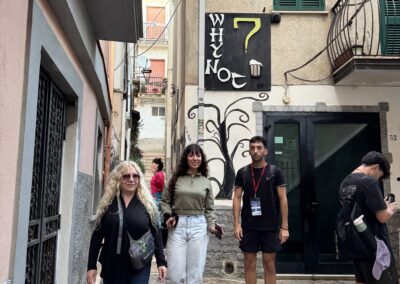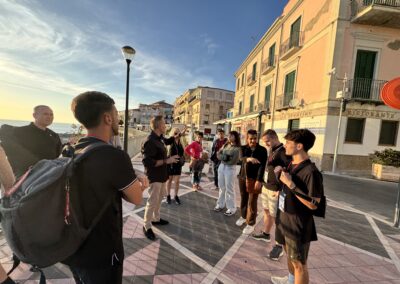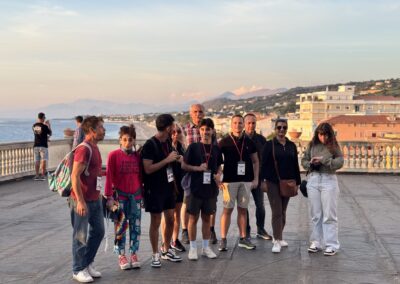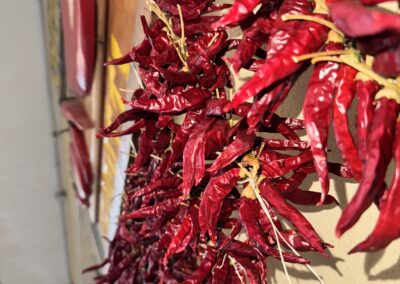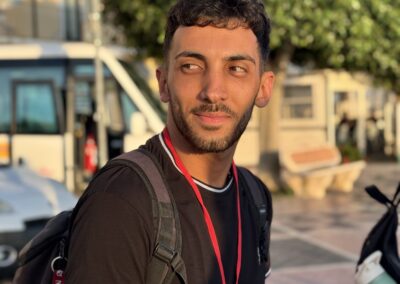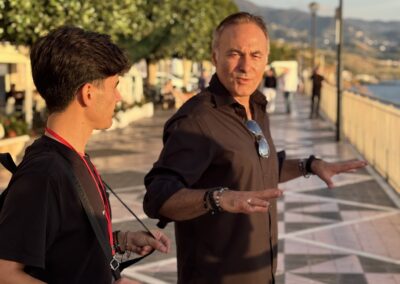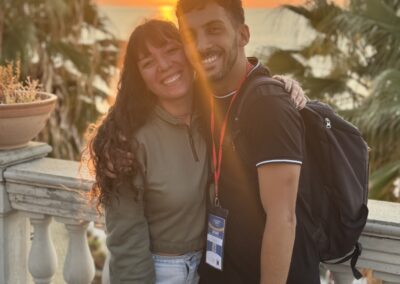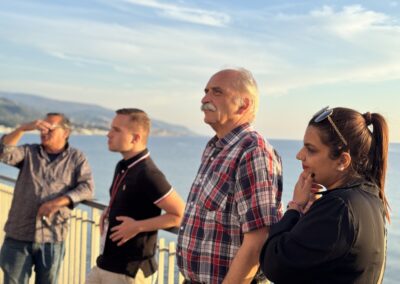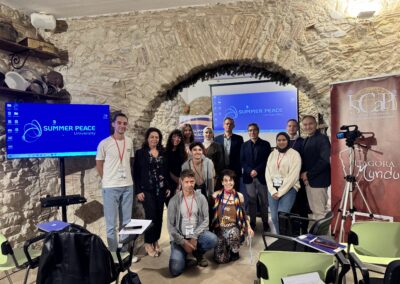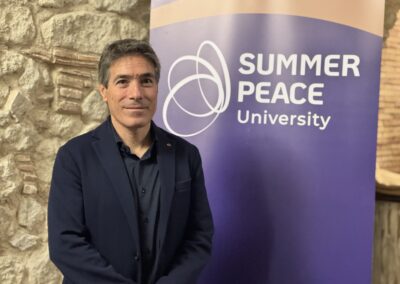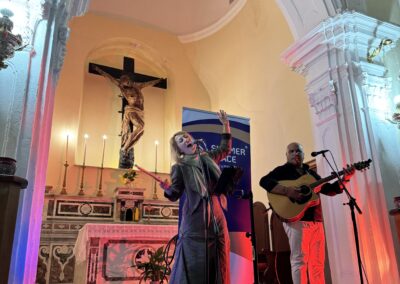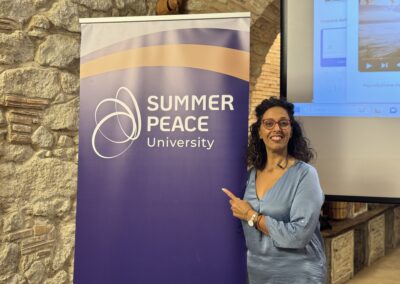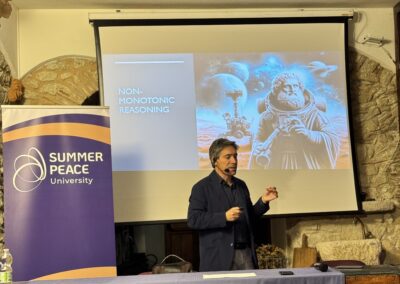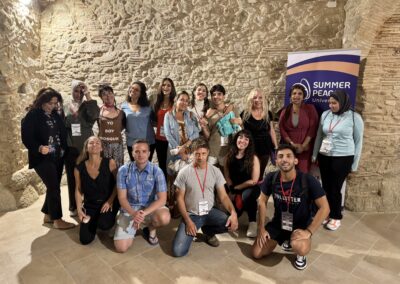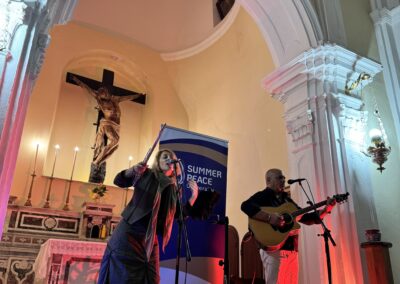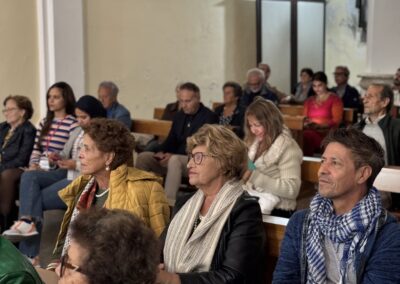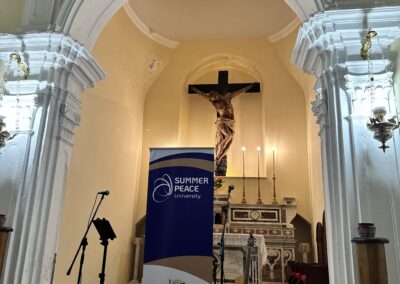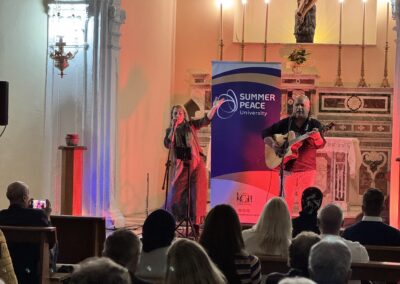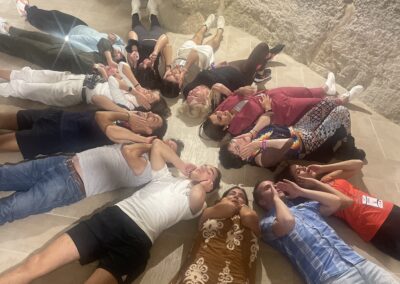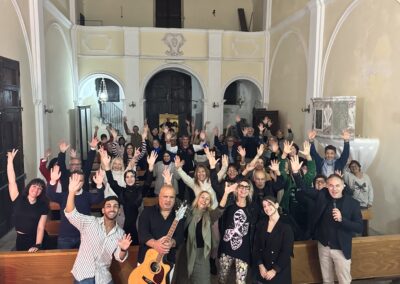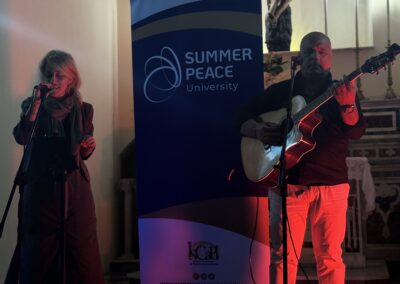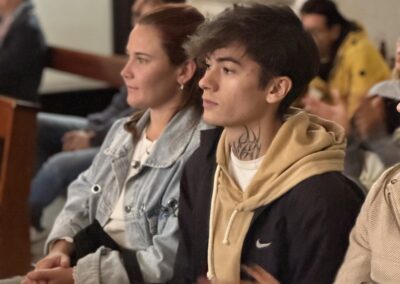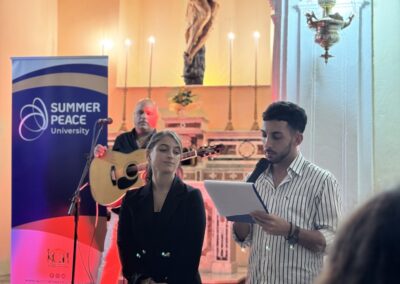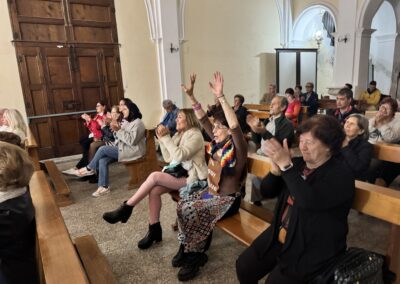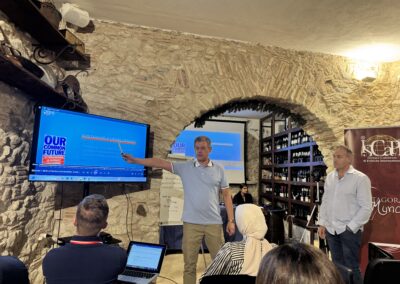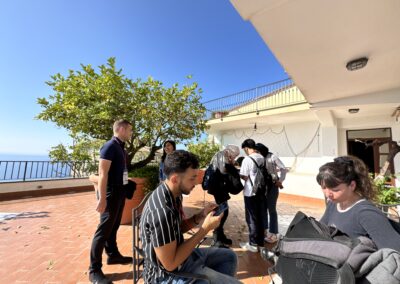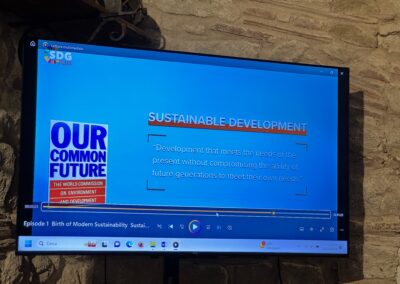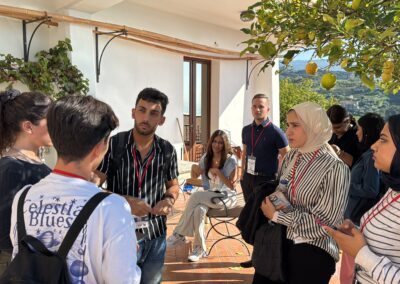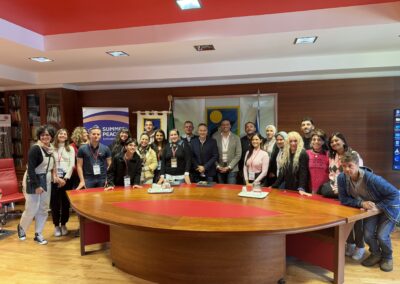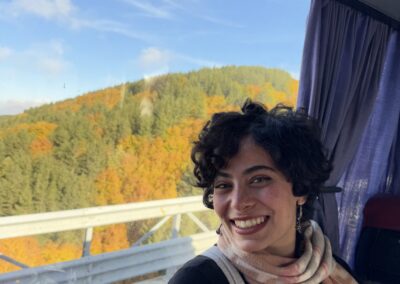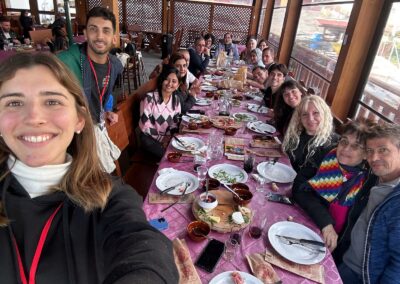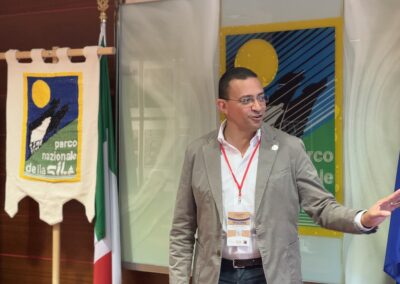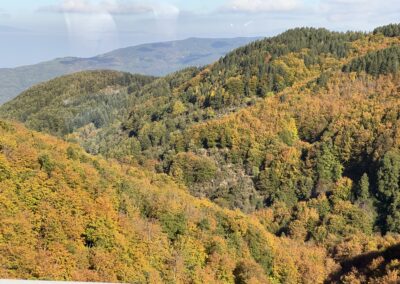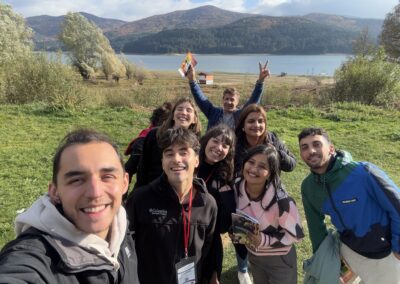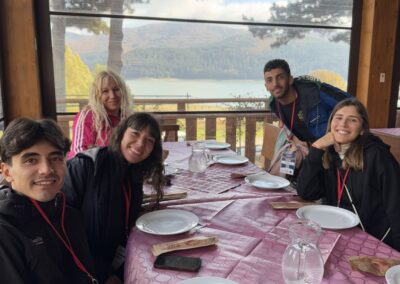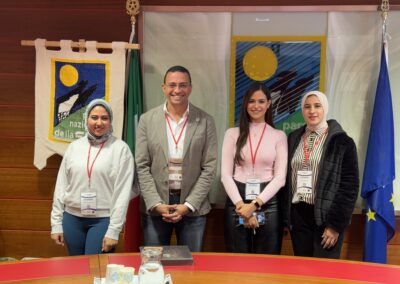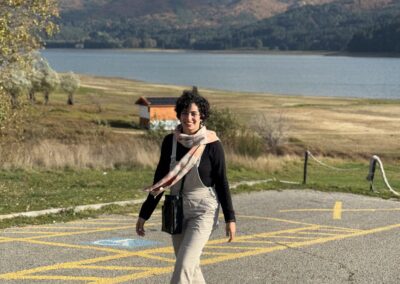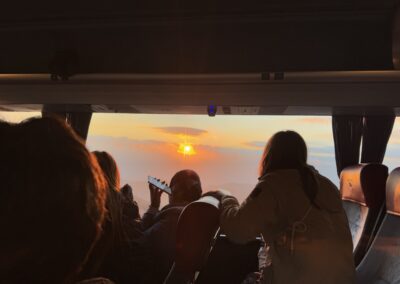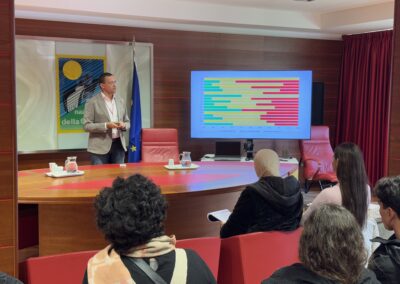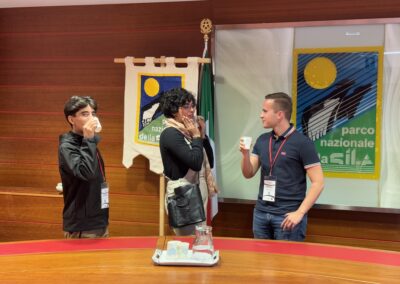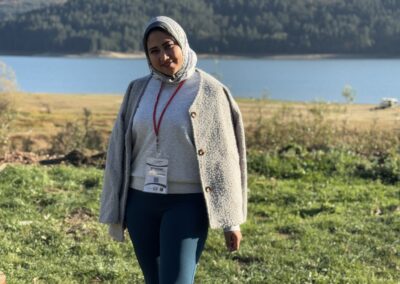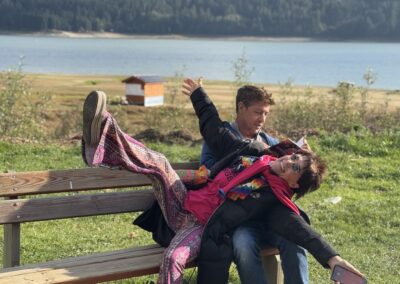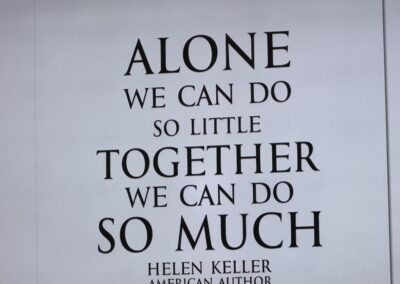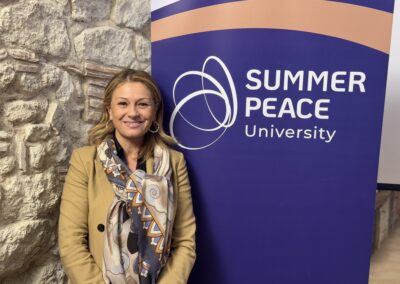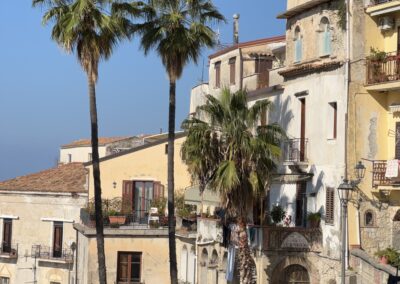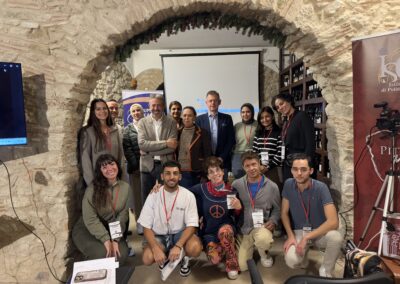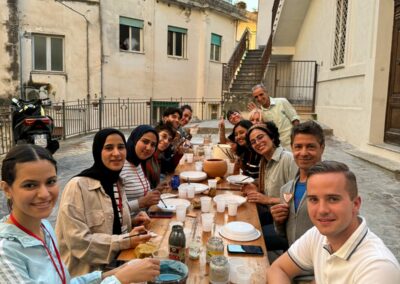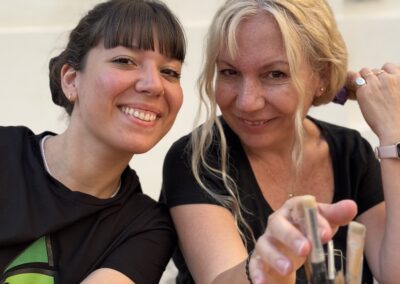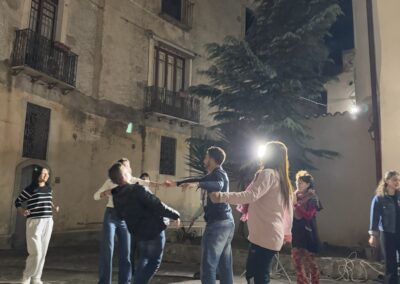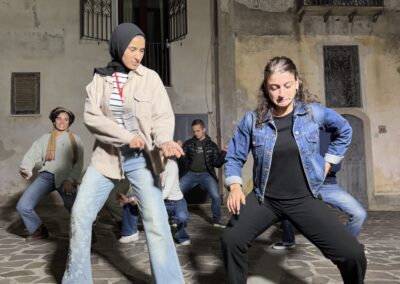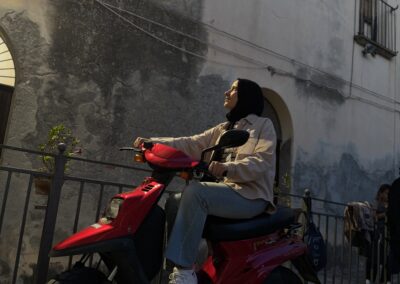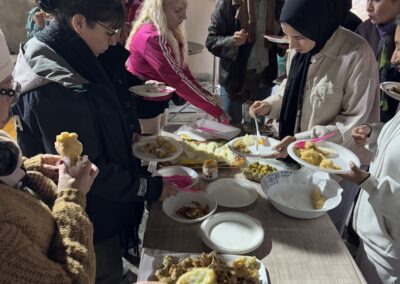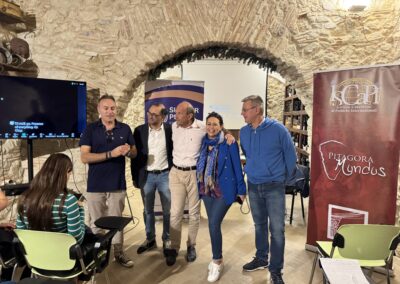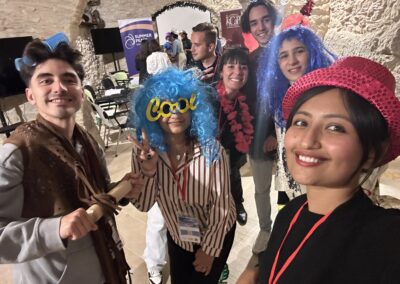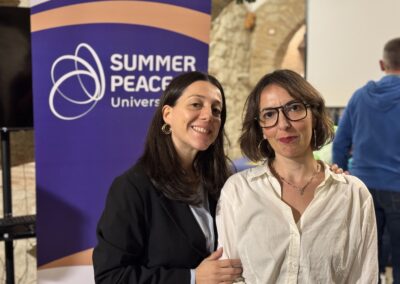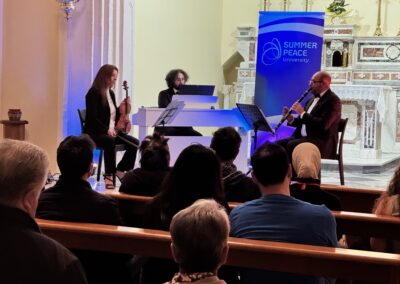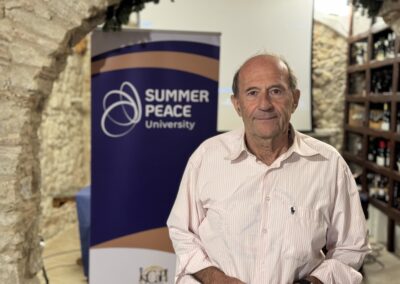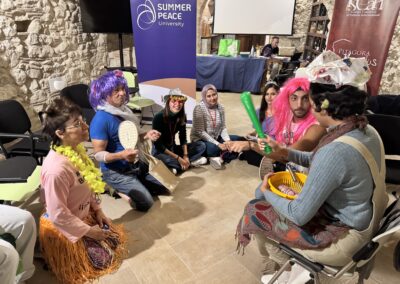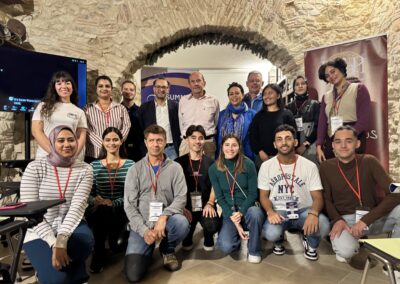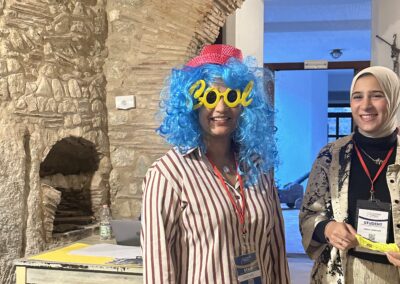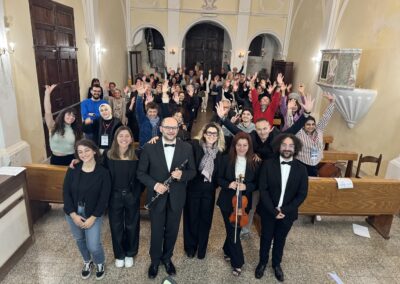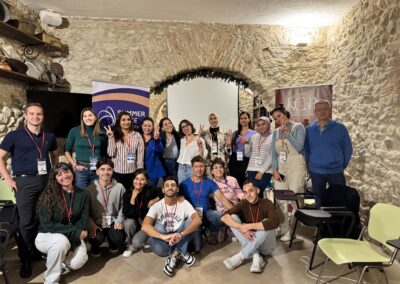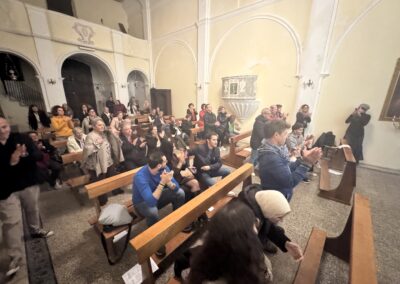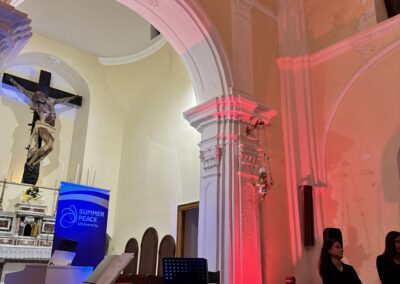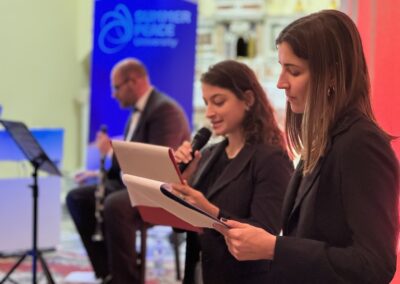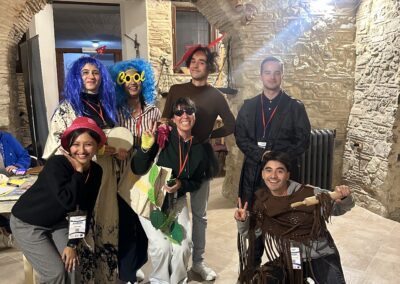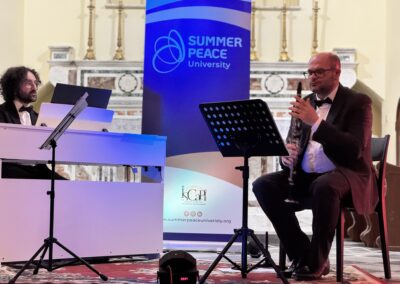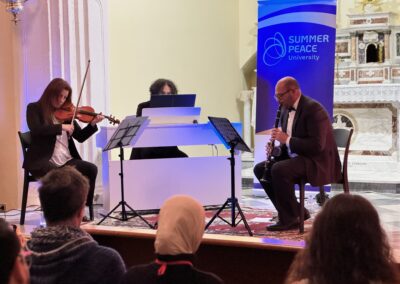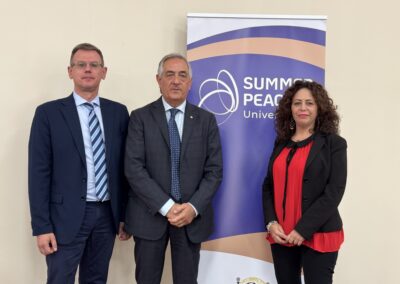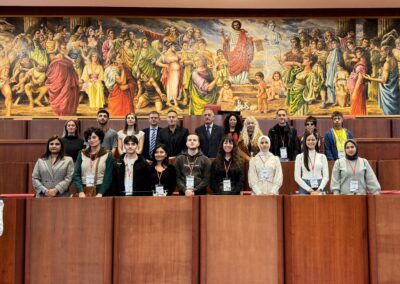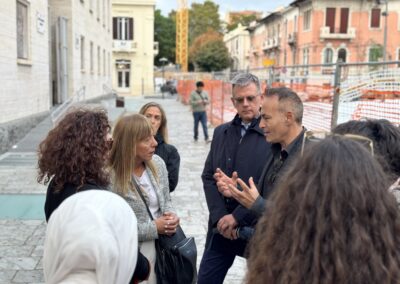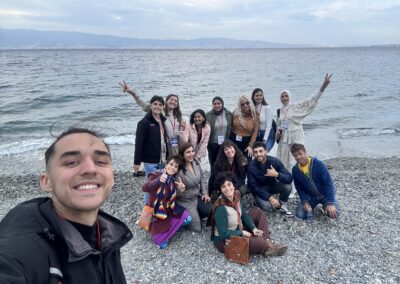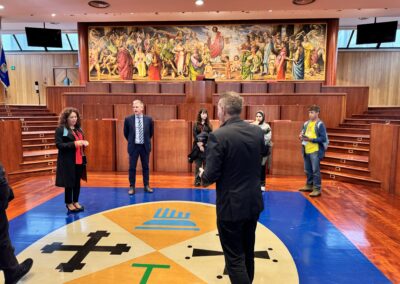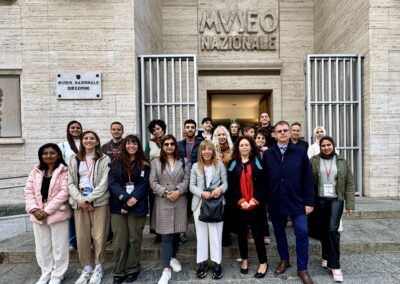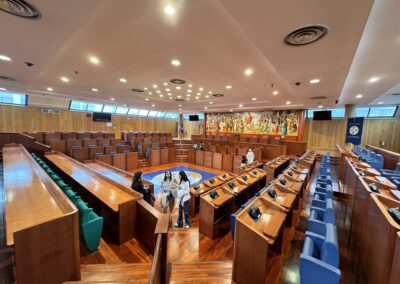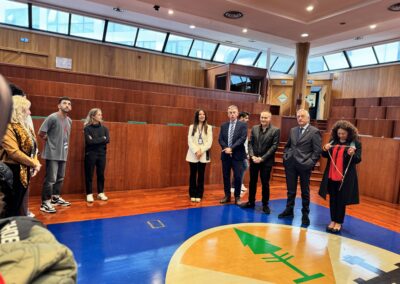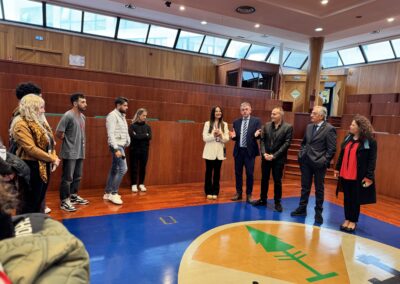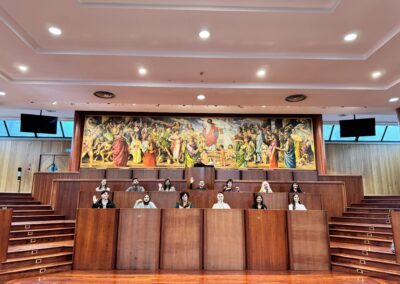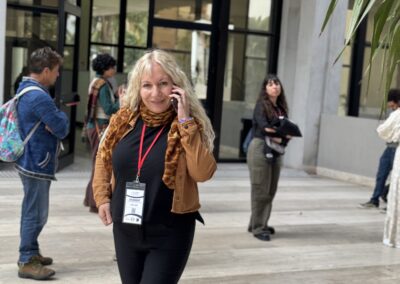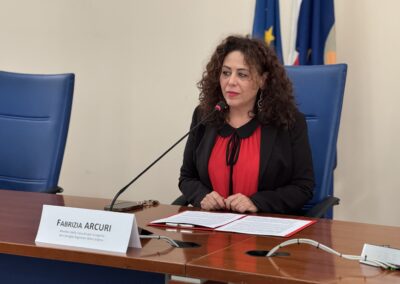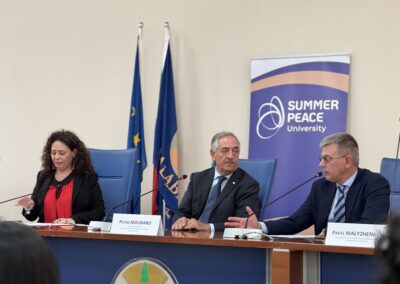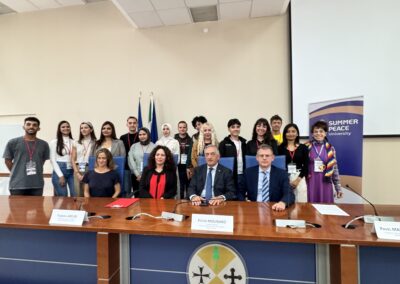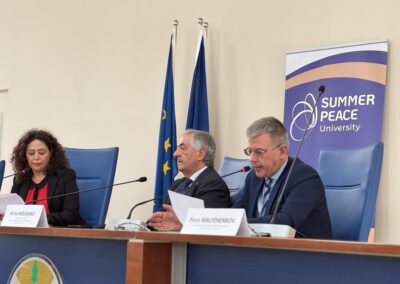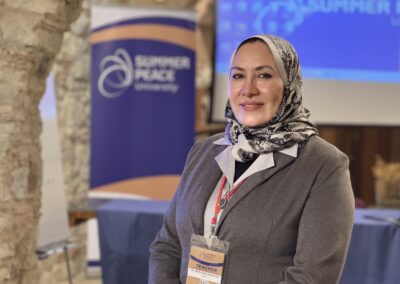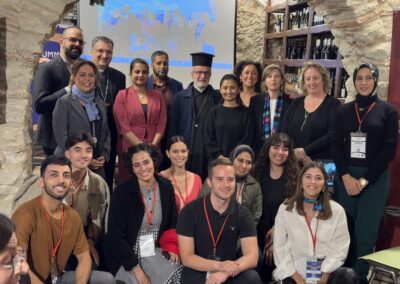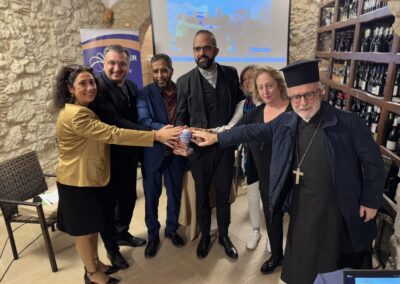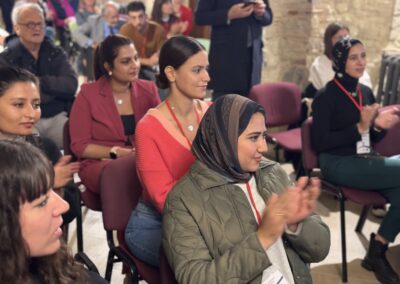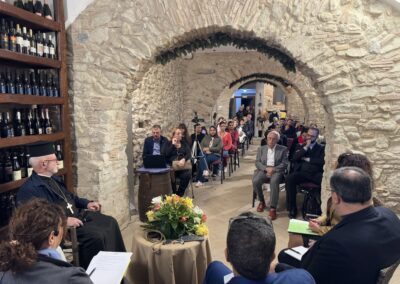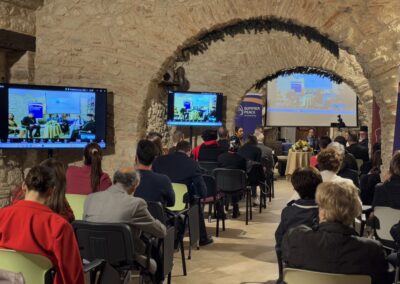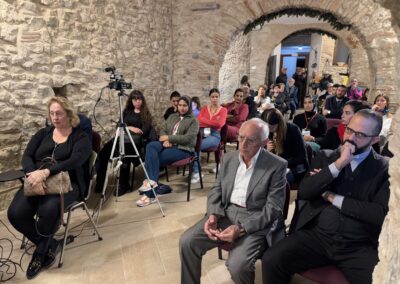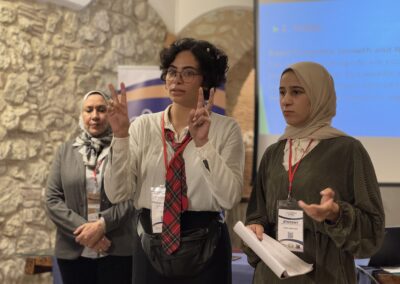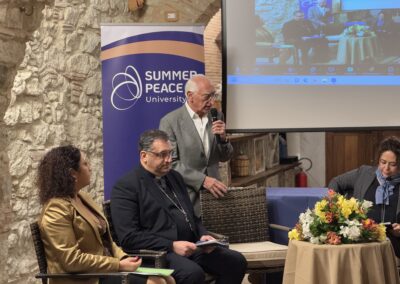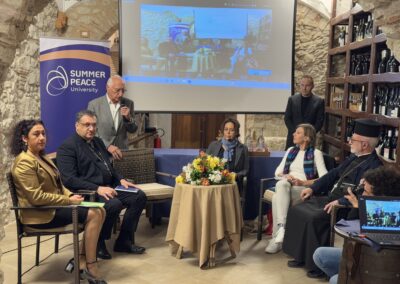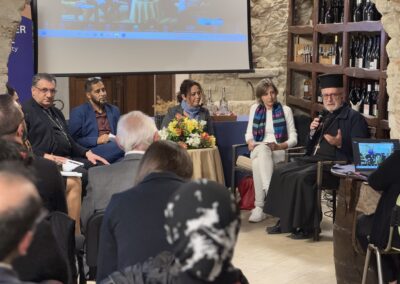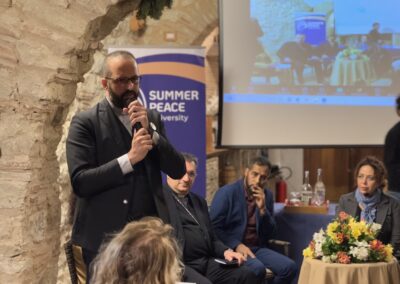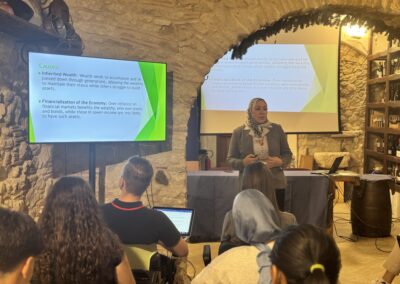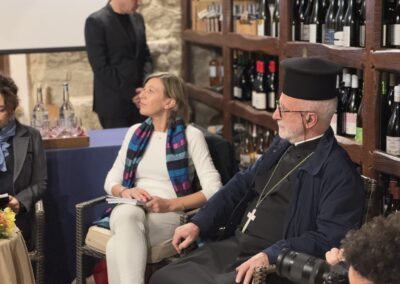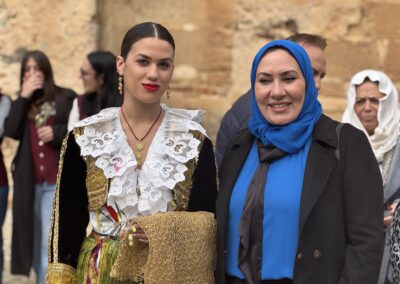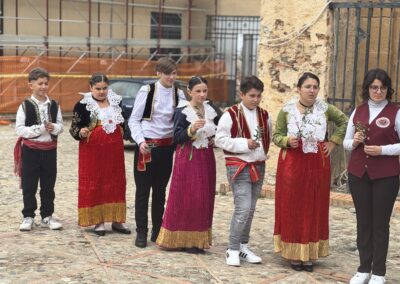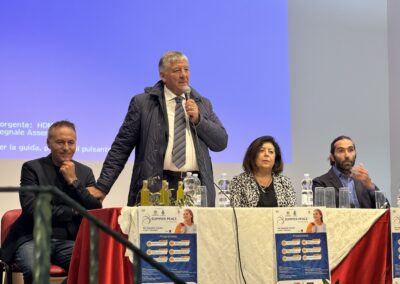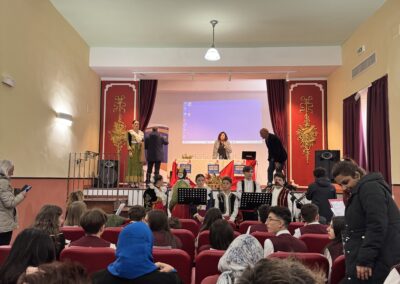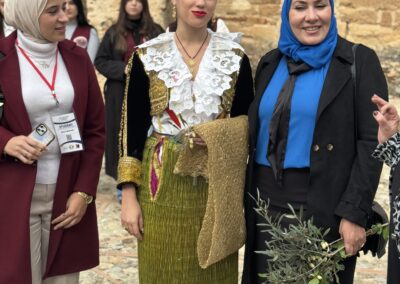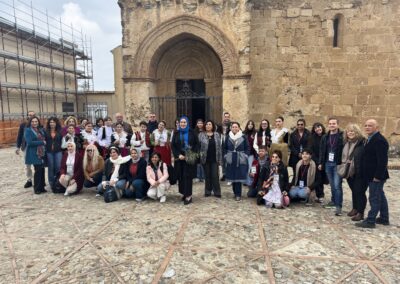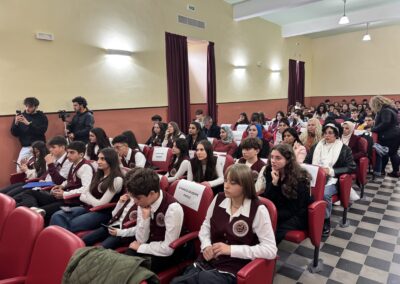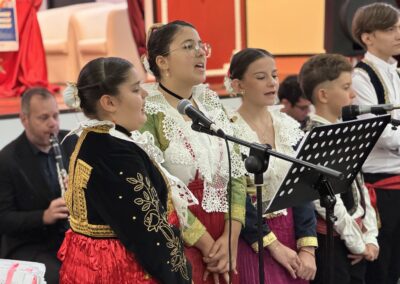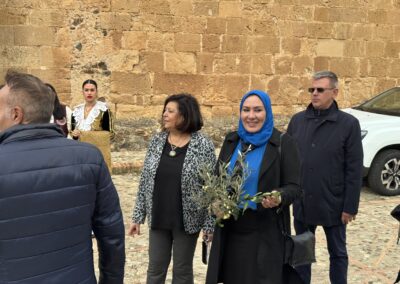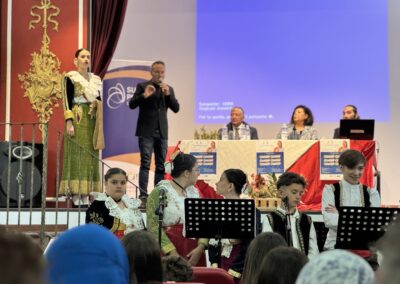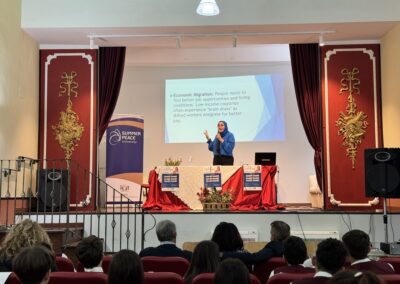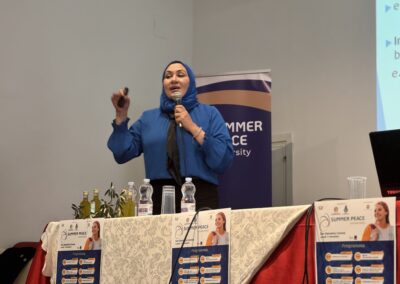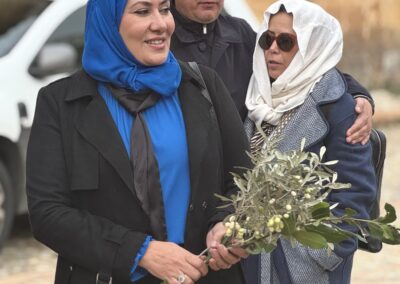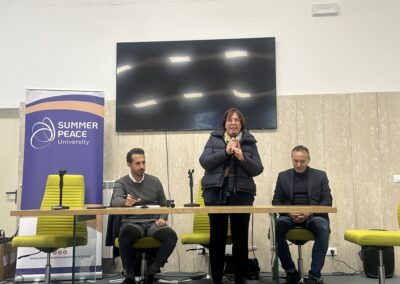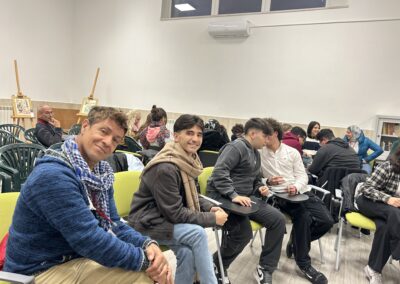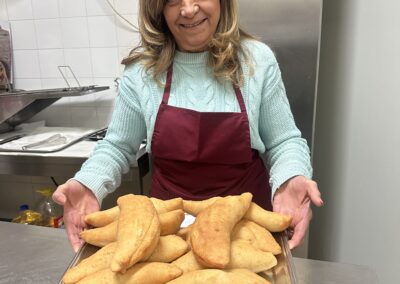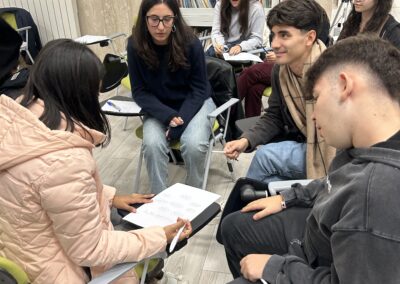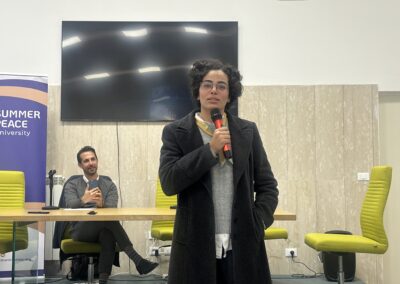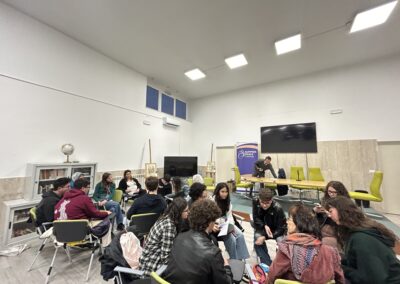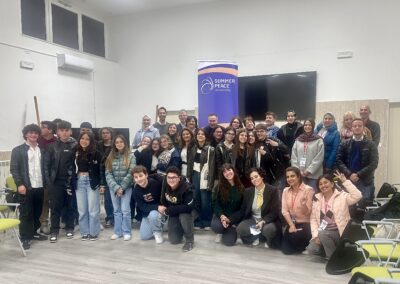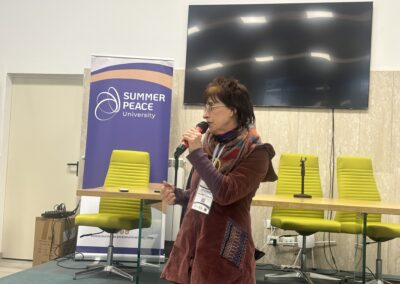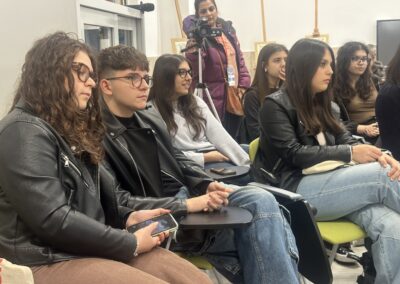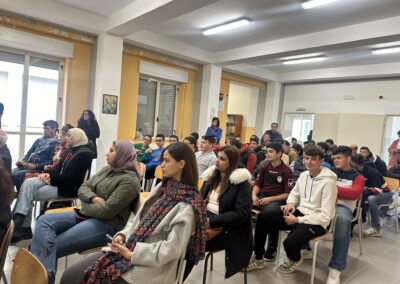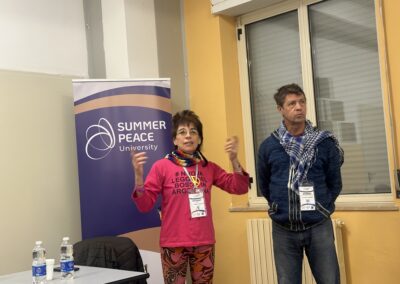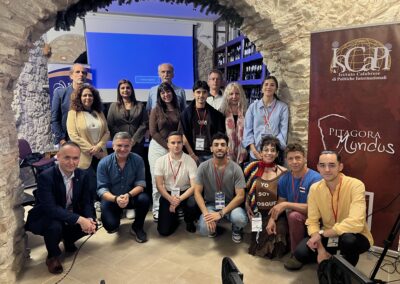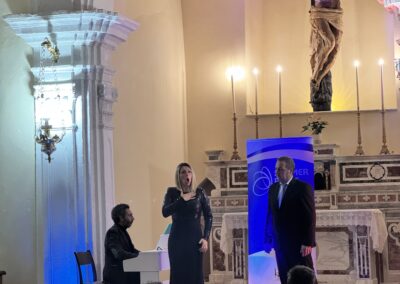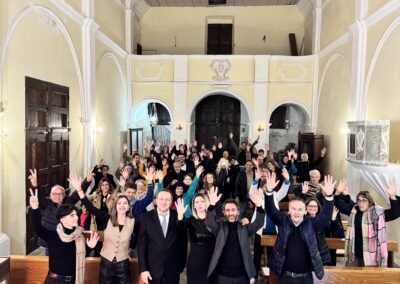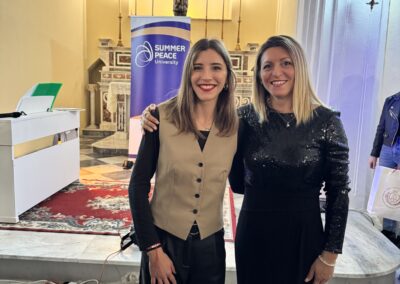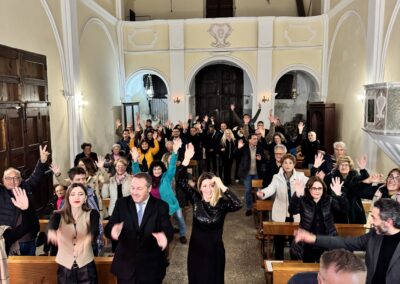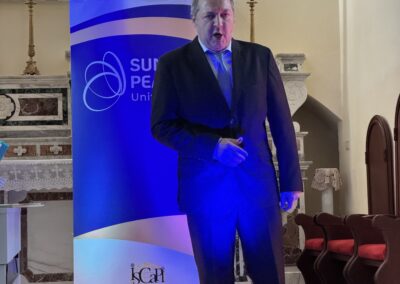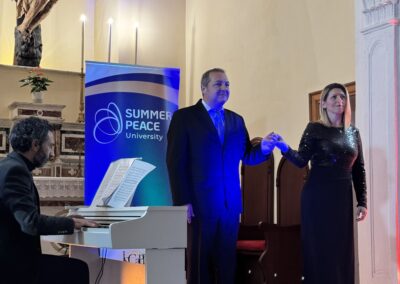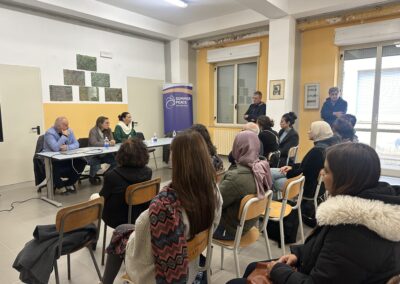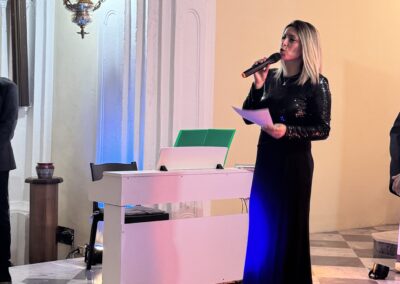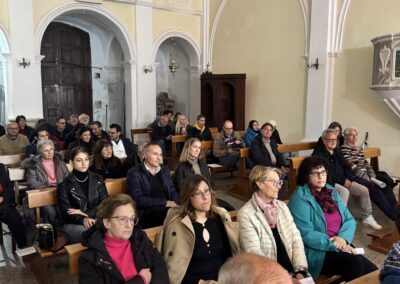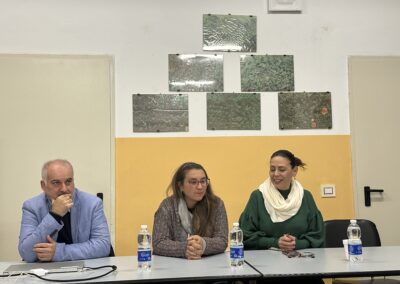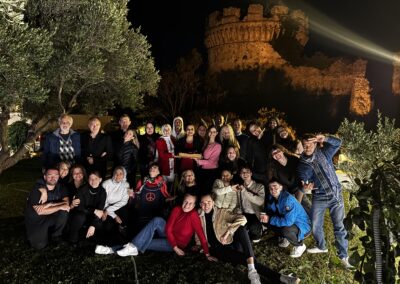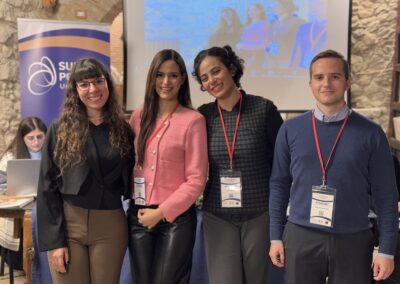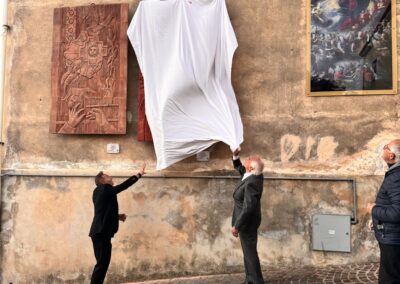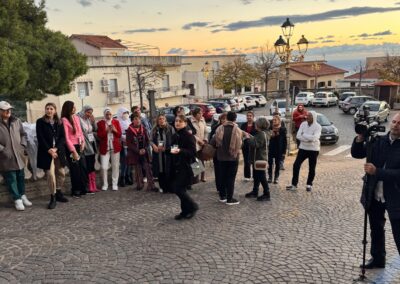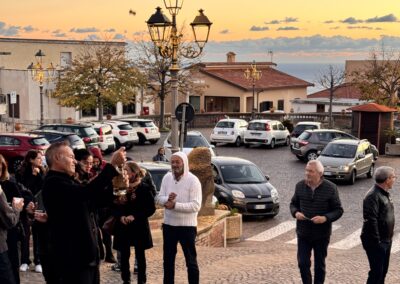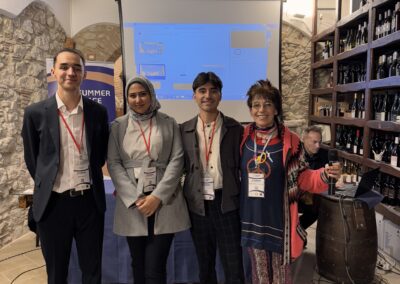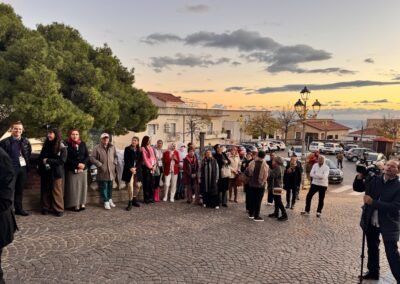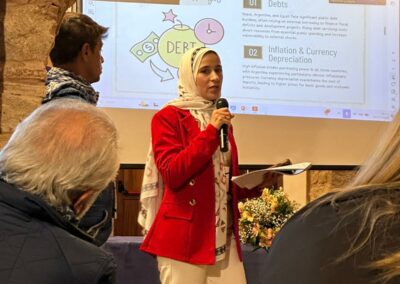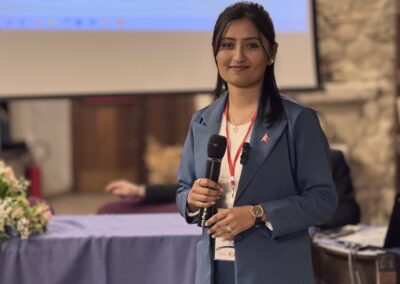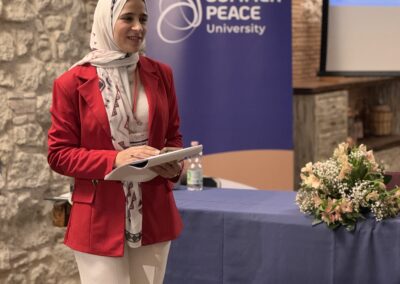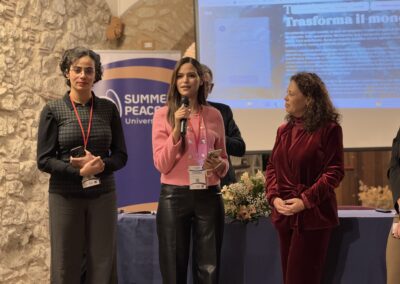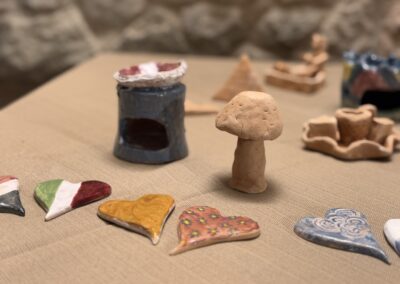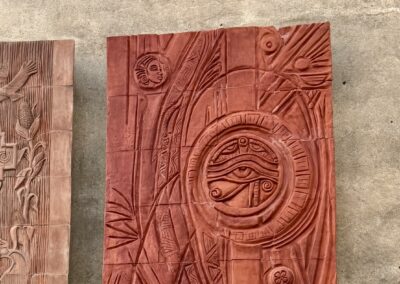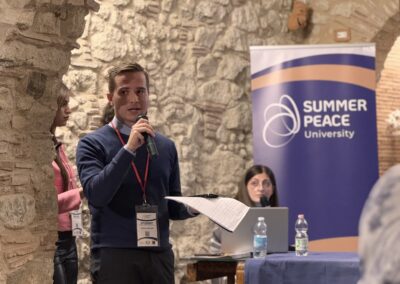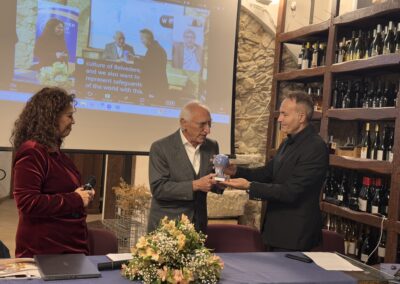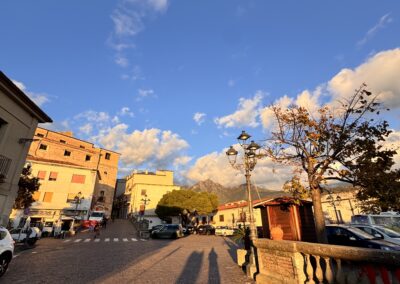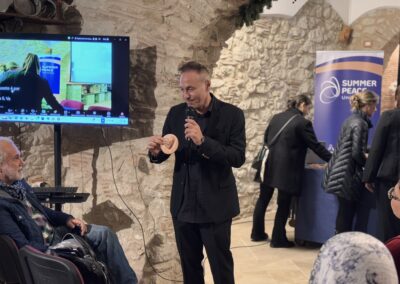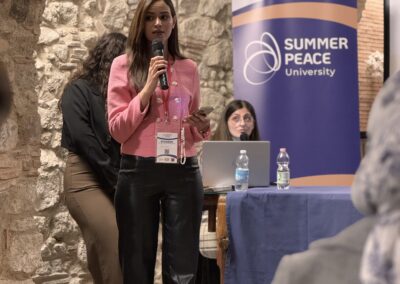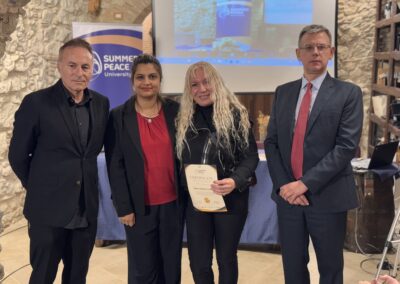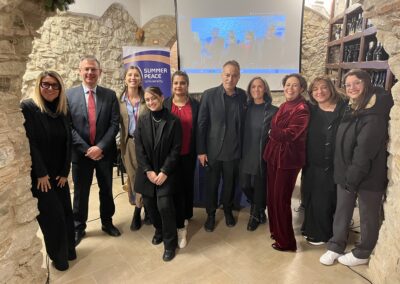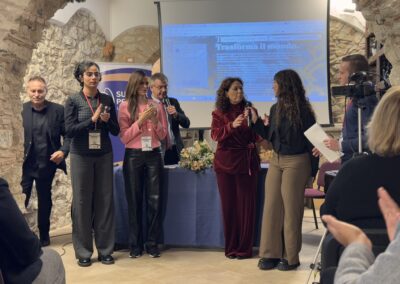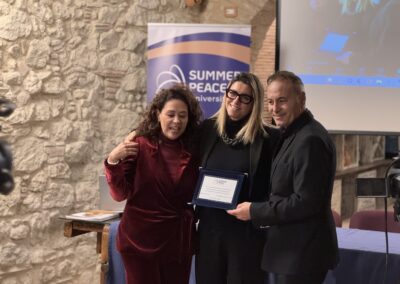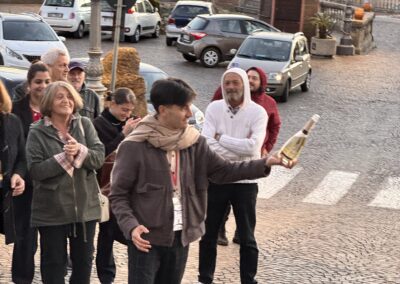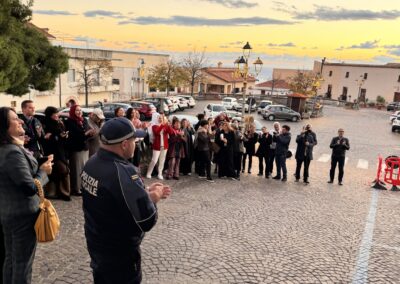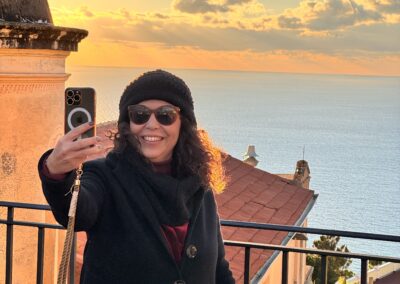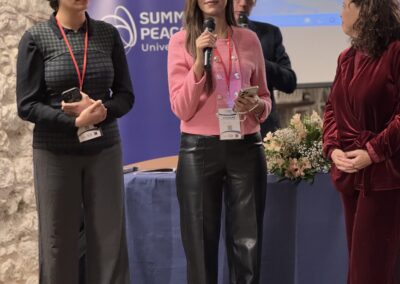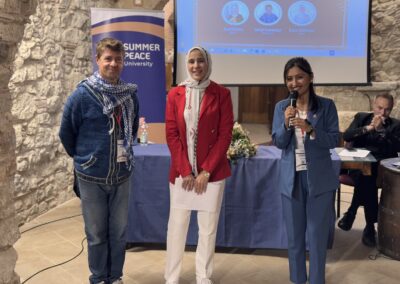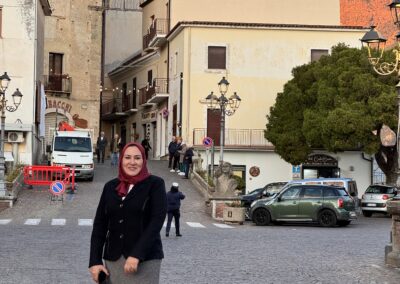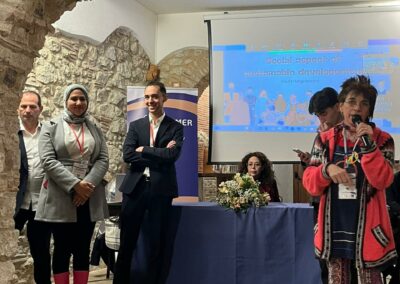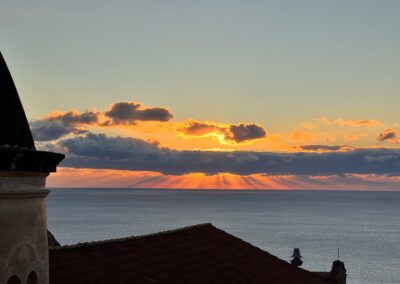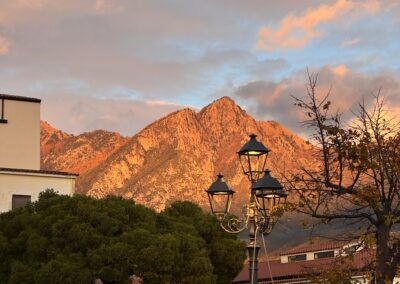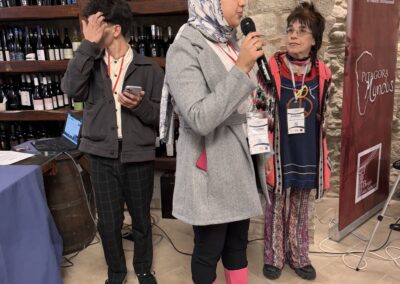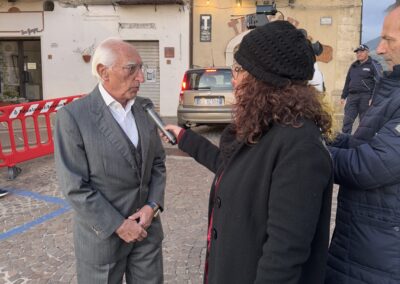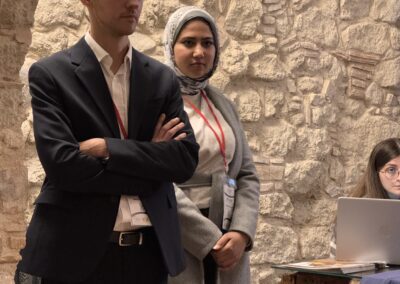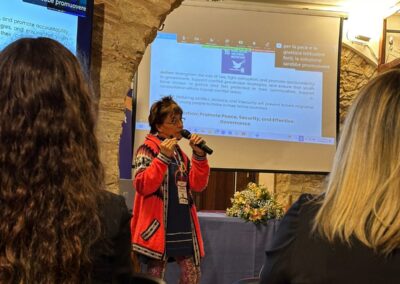Week 1
Week 2
Week 3
Week 4
WEEK 1
21/10
The inaugural edition of the Summer Peace University (SPU) commenced with a ceremonial launch, presided over by Dr. Salvatore La Porta, President of the Calabrian Institute of International Policies, in the historic village center of Belvedere Marittimo. Esteemed professors and students from partner universities across the globe—including Argentina, Egypt, Nepal, and Poland—convened for the opening session.
Participants were introduced to SPU as an international platform dedicated to fostering knowledge exchange, collaboration, and innovation in peacebuilding, cooperation, and sustainable development. Key objectives and an outline of the program’s activities were shared, culminating in the announcement of final group presentations to be delivered on November 15, 2024.
Following the presentation, a guided tour of Belvedere Marittimo’s historic center acquainted participants with key landmarks and local amenities, providing both practical orientation and an opportunity for social integration.
The tour highlighted the charm of the picturesque surroundings, setting the stage for the four-week academic and cultural engagement. The afternoon allowed participants time for personal exploration or relaxation, leading into the evening’s official “Welcome Event.” Hosted by SPU organizers, the dinner and karaoke session fostered camaraderie, creating a vibrant and inclusive atmosphere.
The opening day was widely celebrated as a resounding success, laying the foundation for meaningful dialogue and enthusiastic engagement in the weeks ahead.
22/10
The day began with the inaugural lecture of the Summer Peace University, delivered by Dr. Krystian Chołaszczyński, a distinguished guest professor from Poland and Head of the International Relations Office, as well as the Erasmus+ Programme Coordinator. Dr. Chołaszczyński’s morning session, centered on “The Geopolitics and Geostrategy of the Republic of Poland,” provided an insightful exploration of Poland’s strategic position in global affairs. The lecture commenced with an interactive discussion on general geography, aimed at stimulating interest and laying the groundwork for the more complex geopolitical themes that followed.
Representing Poland were two professors and two students, enriching the session with their perspectives. The lecture delved into Poland’s historical context, physical geography, and its diplomatic relations, expanding into an analysis of global actors, their interconnections, and the geopolitical tensions that shape international relations. Dr. Chołaszczyński’s exploration encouraged participants to critically examine issues such as sustainable international cooperation, conflict resolution, and crisis management.
The session stood out for its depth and the high level of participant engagement, facilitated by its interactive approach. This dynamic start to the program established a foundation for critical thinking and meaningful academic discourse, setting the tone for the remainder of the initiative.
Following the lecture, participants embarked on the “Green Route,” a distinctive feature of the SPU that blends academic learning with experiential exploration. This excursion to the charming seaside town of Praia a Mare allowed participants to immerse themselves in Calabria’s rich natural and cultural heritage. Notable attractions, such as the stunning Isola di Dino and the Madonna della Grotta Sanctuary, nestled within a cave, captivated the group.
The day’s integration of theoretical knowledge with experiential learning was met with overwhelming enthusiasm, as participants expressed appreciation for the blend of classroom instruction and cultural immersion. Upon returning to Belvedere Marittimo, participants had time for personal activities, including grocery shopping, ensuring they were well-prepared for the weeks ahead.
23/10
The third day of the Summer Peace University welcomed two eminent guest speakers: Mr. Enzo Infantino, a renowned human rights advocate and humanitarian, and Mr. Valerio Giacoia, a seasoned journalist. Together, they delivered a compelling lecture titled “The Crisis of Democracies and the Role of the Media in the New Matrix,” which explored the intersection of media, democracy, and human rights in the modern era.
Mr. Valerio Giacoia, hailing from Cosenza, Calabria, drew from his extensive career in journalism, which began in 1991. Having worked for esteemed outlets such as Rotopress, Ansa, and Mondadori, his reporting has spanned Europe, the Middle East, Argentina, and Africa. His lecture recounted pivotal moments from his career, including encounters with marginalized individuals during crises. These stories underscored the critical role of journalism in amplifying the voices of the disenfranchised and spotlighting human suffering.
Mr. Enzo Infantino, a native of Palmi, Calabria, and a former president of the È Stato Il Vento Foundation, provided a humanitarian perspective. Reflecting on his work in refugee missions during the Yugoslav wars and the Syrian conflict, Infantino emphasized the urgent need for global solidarity. His lecture was enriched by a live call from Gaza, where Dr. Federica Lezzi, a cardiologist with Doctors Without Borders, shared harrowing insights into the humanitarian crisis. Dr. Lezzi described the immense strain on medical facilities in Gaza, where hospitals face the daunting task of treating 1,500 patients daily under dire conditions. Her testimony highlighted the devastating impact of armed conflict on civilian populations and underscored the importance of international advocacy.
The session fostered a unified consensus among the speakers and participants on the imperative to uphold justice and international law. Through firsthand accounts of human suffering, participants were reminded of the necessity for dialogue, empathy, and peacebuilding. Mr. Infantino concluded the session with a powerful quote from the Talmud: “By saving one person, it is like saving the entire world,” leaving a profound impression on all attendees.
To provide a harmonious close to an emotionally charged day, the evening featured the inaugural performance of the Summer Peace Music Festival. Vocalist Rosa Antonuccio and pianist Riccardo Gulimi transported the audience on a mesmerizing musical journey, performing iconic compositions from celebrated artists such as Ennio Morricone, Nicola Piovani, Nino Rota, and Hans Zimmer. The concert celebrated the universal language of music as a force for unity and social change, offering participants a moment of hope and reflection.
The integration of poignant storytelling, critical dialogue, and the transformative power of music made the day a cornerstone of the Summer Peace University, inspiring participants to envision art, journalism, and human action as tools for fostering peace and understanding.
24/10
The penultimate day of the first week of Summer Peace University featured a lecture delivered by two guests from the University of Tuscia: Miriam Noto, a doctoral candidate in Historical Sciences and Cultural Heritage, and Dr. Luca Lucchetti, a PhD in the same field. This session stood out for its focus on integrating technology into learning, particularly the use of artificial intelligence (AI) in workshops during the lesson.
The lecture explored the expanding role of AI in society and its ethical, social, and political implications. Key topics included the transformative impact of technological innovations on work, privacy, and daily life. Discussions also delved into transhumanism, addressing the intersection of technological advancement and human evolution.
Miriam Noto, a geographer, shared details of her ongoing research on World War II bombings around the city of Viterbo. She highlighted the importance of geographical information systems (GIS) in historical research and memory preservation. Using ortho-photo mosaics, she demonstrated how wartime destruction is studied and discussed the continuing danger posed by unexploded ordnance in the region.
Dr. Luca Lucchetti, a specialist in 3D modeling and AI, contributed insights into the integration of technology and history, emphasizing how mapping and virtual tools can preserve cultural heritage. Together, the speakers guided students through interactive tasks, such as creating mental maps of personal memories and generating AI-based images for a virtual museum.
Students also explored the Metaverse using virtual reality (VR) goggles, blending real and virtual experiences in an engaging and innovative exercise.
In the afternoon, as part of the “Yellow Path” program on the weekly agenda, participants attended a ceramics workshop. This activity celebrated the ancient artisan traditions of Belvedere Marittimo, allowing students to craft objects using local Calabrian resources. The ceramics workshop offered an opportunity to explore traditional techniques while promoting values of creativity, harmony, and collaboration. Students united hands and minds in creating works that embodied the spirit of peace, underscoring the program’s emphasis on cultural appreciation and shared experiences.
25/10
The concluding day of the first week at the Summer Peace University featured a thought-provoking lecture by Associate Professor Spartaco Pupo, a distinguished scholar in the History of Political Thought from the University of Calabria. Prof. Pupo delivered an incisive session on geopolitics, delving into its academic underpinnings and addressing the fundamental challenges that define this complex field. The lecture underscored the intricate interplay between political philosophy, historical narratives, and their profound influence on contemporary geopolitical dynamics.
Prof. Pupo traced the evolution of political thought, from ancient philosophies to modern theories, while shedding light on the enduring significance of physical and political boundaries and the strategic implications of borders. His analysis provided a nuanced understanding of global conflicts, such as the Russia-Ukraine war and ongoing hostilities in the Middle East. A key takeaway from the lecture was his assertion that sustainable peace requires an in-depth comprehension of power dynamics and a deliberate effort to address the multifaceted realities of international relations.
The session concluded with a lively Q&A segment, where Prof. Pupo engaged with students, offering insightful responses to their inquiries. Following this, he participated in an interview reflecting on his experience at the Summer Peace University. He emphasized the indispensable role of international political theory and cross-cultural studies in equipping future leaders with the tools to foster a more peaceful global order.
The afternoon allowed students time for personal reflection and preparation for the evening’s distinguished event: a visit by Her Excellency Ulumo Abdiraman Moalin, Chargé d’Affaires and Head of Mission of the Embassy of the Democratic Republic of Somalia to Italy. Her Excellency delivered a compelling discussion on Somalia’s future, addressing the pressing geopolitical challenges facing the nation and the African continent at large.
The discourse focused on critical issues of security, stability, and the role of regional partnerships and international cooperation in combating extremism and fostering sustainable peace. Students gained a rare opportunity to engage with a seasoned diplomat, gaining firsthand insights into the intricacies of global governance and the obstacles to building resilience in conflict-affected regions.
The event served as a fitting conclusion to the first week, encapsulating the central theme of geopolitical challenges. Throughout the week, participants explored the intersections of international cooperation, leadership in peacebuilding, and critical global issues such as democratic crises, emerging technologies, and the ethical implications of artificial intelligence. This holistic approach laid a robust foundation for the deeper examination of peacebuilding strategies in the upcoming weeks.
WEEK 2
28/10
The second week of the Summer Peace University commenced with a deep dive into the intersection of energy and geopolitics, expanding on the analytical focus of the first week. The day’s highlight was an enlightening guest lecture by Cavaliere Enrico Grassi, President of E80 Group S.p.A. and a Knight of Labor. Cav. Grassi shared his remarkable entrepreneurial journey, illustrating his transformation of a small electronics and software company into a global leader in mechatronics and automated solutions.
During his lecture, Cav. Grassi provided participants with invaluable insights into the groundbreaking innovations of E80 Group, which has pioneered the completion of over 450 integrated factories and the deployment of more than 9,000 laser-guided autonomous vehicles. These advancements underscore the company’s commitment to enhancing productivity and operational efficiency. He emphasized sustainability as a guiding principle, detailing the group’s efforts to requalify land by converting obsolete factories into state-of-the-art, eco-friendly facilities.
A particularly engaging aspect of the lecture was E80 Group’s collaboration with international universities, including prominent institutions in Kraków, Poland. This global perspective resonated with Polish students and professors in attendance, showcasing how innovation and sustainability can bridge borders and foster international partnerships.
Cultural Immersion: The “Red Route”
The afternoon transitioned from academic exploration to cultural enrichment with the “Red Route,” a thematic journey into the heart of Italian culinary traditions. This segment provided participants with an immersive experience, blending theoretical learning with hands-on practice. Students explored the intricacies of Mediterranean gastronomy, familiarizing themselves with traditional ingredients and the terminology of Italian cuisine.
Under expert guidance, participants prepared iconic Mediterranean dishes, developing a deeper appreciation for the foundational principles of the Mediterranean diet. The culinary experience culminated in an evening of joyous music and dance, reflecting the warmth and conviviality of Italian culture.
Designed to unite participants through the universal language of food, the “Red Route” fostered a family-like atmosphere that strengthened bonds among attendees. This cultural immersion enriched the program’s spirit of collaboration, further enhancing the unique blend of academic, cultural, and interpersonal experiences that define Summer Peace University.
29/10
Tuesday marked a pivotal day at the Summer Peace University as the morning session featured an in-depth lecture by Przemysław Pawlak, Director of the International Projects Office at the University of Social and Media Culture in Toruń, Poland. The session centered on the nuances of project management, equipping participants with critical tools to enhance their contributions to the program and to drive future peace-oriented initiatives across environmental, social, and governmental domains.
A standout moment from Mr. Pawlak’s lecture was his compelling inquiry: “What impact do we want to create, and what kind of real difference do we wish to implement in society?” This question prompted profound reflection among participants, laying the groundwork for their group projects and encouraging them to envision their roles as agents of meaningful change.
Mr. Pawlak’s lecture explored essential elements of Project Cycle Management (PCM), such as understanding stakeholder dynamics, assessing risks, and formulating actionable solutions. He emphasized breaking down overarching objectives into manageable tasks to achieve measurable and impactful outcomes. Additionally, he highlighted the importance of conducting thorough target audience analyses to tailor projects effectively to beneficiaries’ needs.
The afternoon transitioned to the cultural exploration of Calabria’s heritage with the second segment of the “Green Route”—a visit to the picturesque town of Diamante. Known for its vibrant murals and its association with the pepperoncino (Calabrian chili pepper), Diamante offered participants a glimpse into the region’s rich artistic and culinary traditions. Through its storytelling murals and distinctive cultural identity, Diamante encapsulated the profound connection between art, history, and regional pride. This excursion, part of the university’s initiative to explore Calabria’s most enchanting villages, allowed students to decompress, forge camaraderie, and appreciate the intricate interplay of culture and peacebuilding.
30/10
Wednesday’s activities commenced with an intellectually invigorating presentation by Prof. Francesco Scarcello, Vice-Rector and esteemed AI researcher at the DIMES department of the University of Calabria. Widely regarded as one of Europe’s foremost authorities in artificial intelligence, Prof. Scarcello’s pioneering contributions have garnered him international acclaim, positioning him as a luminary in both academic and applied AI disciplines.
Building on foundational AI concepts introduced in earlier lectures by professors from the University of Tuscia, Prof. Scarcello delivered a practical demonstration focusing on the optimization of chatbot systems. By instructing students on crafting advanced prompts, he enabled them to enhance search accuracy and efficiency—imparting invaluable skills for research and data analysis.
The lecture extended beyond technical proficiency, highlighting AI’s transformative potential in peacebuilding and international cooperation. Students were challenged to:
- Identify pressing global issues where AI could drive meaningful change.
- Develop innovative solutions leveraging AI while addressing ethical considerations.
- Examine critical concerns such as algorithmic bias, privacy, and the far-reaching implications of AI on global relations.
This deeply thought-provoking session reinforced AI’s role as a catalyst for fostering collaboration, innovation, and peace across diverse contexts.
The day’s discussions on sustainability featured insights from two distinguished guest speakers: Giuseppe Bonanno, Director of the North Calabria Area for Intesa Sanpaolo, and Carolina Cairo, CEO of Gamian Consulting S.r.l.
Carolina Cairo delved into her company’s groundbreaking advancements in renewable energy solutions. She spotlighted Gamian Agro, a visionary initiative integrating agricultural practices with photovoltaic energy production to champion sustainable development. Her presentation underscored the seamless intersection of technological innovation and environmental stewardship.
Giuseppe Bonanno, representing Intesa Sanpaolo, one of Europe’s preeminent banking institutions, explored the financial sector’s pivotal role in driving social and environmental progress. By emphasizing responsible investment and Environmental, Social, and Governance (ESG) frameworks, he illustrated how banking could serve as a powerful instrument for societal transformation. The synergy between these diverse perspectives inspired students to envision creative, impactful approaches to sustainability, fostering a spirit of innovation and responsibility.
Afternoon Session: Laughter Yoga for Holistic Well-being
In a refreshing departure from conventional sessions, students participated in laughter yoga, facilitated by the dynamic instructor Graziella Mazza. This transformative activity aimed to nurture emotional and physical well-being while breaking down linguistic and cultural barriers.
Graziella shared a profound philosophy imparted by her mentor:
“If you laugh, you change; if you change, the world changes with you.”
The session encouraged participants to embrace authenticity, step beyond comfort zones, and connect through the shared joy of laughter. This initiative perfectly aligned with Summer Peace University’s mission to foster self-discovery, growth, and harmony.
The exercise encouraged participants to step out of their comfort zones, embrace their authentic selves, and connect with one another through shared joy. Summer Peace University was thrilled to host this experience, as it aligned with the program’s mission of fostering growth, self-discovery, and peace.
Evening: Music as a Bridge of Unity
The day culminated in an enchanting musical event, the second installment of the Summer Peace Festival, celebrating iconic Italian singer-songwriters, including Fabrizio De André, Francesco De Gregori, Mango, and Mina.
Featuring a soulful performance by Rosa Antonuccio, accompanied by guitarist Ciriaco Siniscalchi and vocalist Irene Cantisani, the concert seamlessly blended Italian musical traditions with ethno-pop influences.
This artistic evening highlighted the transcendent power of music, dissolving cultural and linguistic barriers to foster unity and intercultural dialogue— principles at the heart of the Summer Peace University ethos.
31/10
On October 31, Dr. Salvatore La Porta, President of Summer Peace University, delivered an insightful lecture aimed at introducing participants to the Sustainable Development Goals (SDGs) and their significance, as well as the contrasting framework of BRICS. The session provided a comprehensive overview of these two global approaches to addressing shared challenges, emphasizing their underlying philosophies and objectives.
The lecture began with an exploration of the SDGs, a set of 17 goals launched by the United Nations in 2015. This global framework aims to tackle critical issues such as poverty, hunger, and climate change by fostering collaboration among nations. Dr. La Porta underscored the interdependent nature of these challenges and the need for a unified global effort to address them effectively. Participants gained a deeper understanding of the SDGs’ targets, which are designed to promote sustainability across three essential pillars: environmental protection, social equity, and economic growth. The ultimate aim of the SDGs is to create a more inclusive and sustainable world by 2030.
In contrast, the discussion turned to BRICS, a bloc of nations including Brazil, Russia, India, China, and South Africa. Established in 2001, BRICS represents an alternative vision for global cooperation, prioritizing a multipolar world order and economic sovereignty over interconnected global systems. Through the lens of this model, participants explored how BRICS seeks to redefine international economic dynamics by advocating for national autonomy and establishing new financial structures. The bloc’s recent expansion to include Egypt, Iran, and Ethiopia was highlighted as a reflection of its growing influence in global affairs.
Dr. La Porta provided historical context by discussing the origins of the term “sustainability,” which became mainstream following the 1987 Brundtland Commission. The session incorporated multimedia elements, including videos that detailed the evolution of sustainable development goals and their implementation.
The lecture emphasized the significance of the SDGs as a universal framework for addressing global challenges, while contrasting them with the BRICS model, which offers a distinct approach rooted in strategic cooperation and resistance to Western-dominated systems. By comparing these paradigms, participants were encouraged to critically evaluate the diverse strategies required to achieve global peace, sustainability, and equity.
This session provided a thought-provoking foundation for understanding the complexities of global governance, leaving participants with a greater appreciation of the importance of implementing the SDGs and the role of alternative frameworks like BRICS in shaping the future.
WEEK 3
4/11
The third week of the Summer Peace University (SPU) transitioned to addressing pivotal global challenges: Climate Change, Justice, and Corruption. Monday’s program marked a significant departure from the conventional lecture format, integrating learning into the “Green Route” initiative.
Participants embarked on an excursion to Sila National Park, a serene and ecologically rich venue that provided the perfect backdrop for an immersive exploration of climate change and biodiversity. This extraordinary session was made possible through the collaboration of Dr. Francesco Adamo, Francesco De Vuono, and the dedicated team at GAL SILA, and featured Dr. Ahmed Elshazly, Director of Sponsored Programs, Centers, and International Relations at Heliopolis University for Sustainable Development, Cairo, Egypt. Dr. Elshazly, delivered a dynamic and thought-provoking lecture. Employing a blend of interactive discussions and multimedia presentations, he introduced participants to critical concepts, including:
- Ecosystems and ecosystem services
- Sustainable development principles
- The interconnectedness of the biosphere
Dr. Elshazly stressed the importance of transforming sustainable development from theoretical discourse into practical, measurable actions that yield tangible benefits for the planet.His lecture resonated deeply with students, particularly those tackling environmental issues as part of their final projects.In a poignant moment of solidarity, a minute of silence was observed in honor of the victims of recent flooding in Valencia, Spain. This reflective gesture underscored SPU’s mission to nurture empathy, unity, and awareness among future leaders, bridging the gap between environmental education and real-world crises.
5/11
Tuesday’s sessions at the Summer Peace University (SPU) focused on two critical themes: Accessible Education and Global Citizenship for a Sustainable Future and Corruption Prevention and Ethical Leadership. The day emphasized the transformative role of education in addressing poverty and inequality and the societal imperatives of combating corruption to foster integrity and justice.
The morning began with an enlightening lecture by Mr. Angelo Serio, Director of Project Management and Initiatives at Save the Children. With years of experience in advancing children’s rights, Mr. Serio provided a compelling analysis of the global challenges faced by vulnerable youth. He underscored the pivotal role of accessible education as a transformative tool to empower individuals and build equitable societies. By sharing real-world examples, he demonstrated how effective leadership and dedication to justice could drive significant societal change. Participants were encouraged to view education not merely as a right but as a critical pathway to global citizenship and peacebuilding, inspiring them to consider actionable strategies for addressing educational inequities. The afternoon session featured Dr. Ersilia Amatruda, a renowned advocate for Calabria’s cultural heritage and an expert on corruption prevention and transparency. Dr. Amatruda’s lecture delved into the pervasive issue of corruption, highlighting its corrosive impact on societal structures and its far-reaching consequences on governance, development, and social equity. Drawing on data and insights from Transparency International, she explored the nature of corruption and proposed strategies to combat it at both local and global levels. Describing corruption as a societal “disease,” Dr. Amatruda emphasized that it is not insurmountable. By cultivating strong ethical values, prioritizing integrity, and fostering a culture of accountability, societies can effectively counteract corruption’s detrimental effects. Her lecture served as a vital reminder that combating corruption requires a collective effort, informed strategies, and an unwavering commitment to justice and equality.
The afternoon´s agenda shifted to cultural enrichment through the Yellow Path activities, continuing the exploration of ceramic techniques introduced in Week 1. Participants had the opportunity to appreciate the fruits of their creative efforts, deepening their connection to Calabria’s artistic heritage.
Subsequently moving from one path to another, as part of the ongoing “Red Route” tradition, the evening offered a unique blend of cultural immersion and culinary exploration. Participants took part in the preparation of “Le Crispelle,” a cherished local dish, gaining firsthand experience of Calabria’s rich culinary heritage. This gastronomic event fostered cross-cultural connections, providing a platform for dialogue and camaraderie while celebrating the region’s traditions.
The day’s sessions collectively reinforced SPU’s mission of empowering future leaders to address pressing global challenges through education, ethical leadership, and cultural exchange. The integration of expert insights with experiential learning underscored the program’s holistic approach to fostering sustainable peace and global citizenship.
6/11
The day began with an insightful lecture by Mr. Nino Galloni, a prominent Italian economist and vocal critic of traditional economic policies. Known for his advocacy of post-Keynesian economic approaches and sustainable practices, Mr. Galloni has played a transformative role in shaping Italy’s economic discourse. A graduate in law from La Sapienza University, Rome, he currently serves as Rector of Unicampus-HETG in Geneva and President of the Center for Monetary Studies. His acclaimed publications, such as The Revolution of Money and Who Betrayed the Italian Economy?, underscore his commitment to equitable growth, wealth redistribution, and social inclusion.
Mr. Galloni’s lecture offered a profound redefinition of money as a tool for societal benefit rather than an instrument of public debt accumulation. This approach aligns with his vision of a more just and sustainable economic future. The session was highly interactive, encouraging participants to analyze economic processes shaping global markets and to share perspectives on dedollarization, a timely topic given recent initiatives by BRICS nations to bypass the U.S. dollar as the standard currency for international trade. The discussion illuminated the implications of alternative economic paradigms, emphasizing collective well-being in global financial systems. The afternoon transitioned to an engaging team-building session facilitated by Goodwill representatives. Participants engaged in a series of innovative exercises designed to foster mutual understanding and deeper connections. The centerpiece of the session was a theatrical activity, wherein participants were tasked with creatively capturing Calabria’s vibrant cultural heritage using limited resources. This activity challenged participants to step out of their comfort zones, adopt new perspectives, and collaborate in novel ways.
A key takeaway from the session was the distinction between being part of a team and merely functioning within a group. Anchored by a shared vision of peace, participants recognized that despite cultural and national differences, the universal aspiration for harmony transcends borders. The session significantly enhanced participants’ ability to collaborate on their final projects, reinforcing unity and understanding. The Summer Peace University expressed gratitude to Goodwill for their innovative and transformative approach, which underscored the power of teamwork in achieving common goals of peace and harmony.
The day concluded with an instrumental concert performed by a classical trio featuring Andrea Bosa (piano), Giovanna Ferraro Caruso (violin), and Domenico Russo (clarinet). The trio presented a masterful repertoire that included works by Verdi, Fauré, Khachaturian, Milhaud, and Piazzolla. Their performance wove together evocative melodies, guiding the audience on a profound emotional journey. The concert celebrated the universal language of music, inspiring reflection on peace and its enduring resonance.
7/11
The third week of the Summer Peace University continued to inspire and educate, with participants embarking on a transformative excursion to Reggio di Calabria, a city nestled by the Strait of Messina in southern Calabria. This visit, part of the ongoing “Green Route” initiative, seamlessly integrated themes of legality, history, and cultural exploration, offering a holistic learning experience.
The day commenced with a significant meeting at the Regional Council of Calabria, where participants engaged with Pietro Molinaro, the Regional Councilor of Calabria and President of the Legality and Anti-‘Ndrangheta Commission. Held under the auspices of the Regional Council, this event focused on the themes of legality and the fight against organized crime, underscoring Calabria’s commitment to educating future generations on justice and social responsibility.
This pivotal session provided a platform for Summer Peace University students, faculty, and international experts to engage directly with regional institutions. The discussion emphasized that organized crime, particularly the ‘Ndrangheta, is not merely a local concern but a global challenge with far-reaching implications. The dialogue built upon previous lectures on corruption, reinforcing the interconnected nature of global justice efforts.
During the session, Fabrizia Arcuri, a member of the Legality Council, delivered an incisive analysis of the ‘Ndrangheta’s transnational operations. Her presentation shed light on the far-reaching networks of organized crime and the critical legislative frameworks needed to combat them. Pavel Malyzhenkov, Coordinator of the International Scientific Committee, enriched the discourse by offering international perspectives, leading multilingual discussions, and facilitating inclusivity across diverse linguistic backgrounds.
Following this engagement, participants visited the renowned National Archaeological Museum of Reggio di Calabria (MArRC), where they were joined by Senator Tilde Minasi of the Italian Parliament. Senator Minasi guided participants through the museum’s exceptional collection, immersing them in Calabria’s cultural legacy.
The museum showcased the region’s rich Greek heritage, including ancient artifacts from the Magna Graecia era, alongside prehistoric treasures from the Paleolithic and Mesolithic periods. These exhibits offered profound insights into Calabria’s role in shaping early Italian civilization and its enduring cultural significance.
The excursion to Reggio di Calabria exemplified Calabria’s dual commitment to addressing contemporary challenges, such as organized crime, while celebrating its ancient cultural heritage. This integration of legality and history provided participants with a deeper appreciation of Calabria’s contributions to global discussions on justice, heritage, and peacebuilding, solidifying the day as a cornerstone of the Summer Peace University experience.
8/11
The final day of the third week of Summer Peace University (SPU) was marked by two significant events that underscored the program’s commitment to global issues and peacebuilding. Participants had the privilege of attending a thought-provoking lecture by Prof. Gihan Mohamed from Egypt. This session addressed the future of the global economy and wealth inequalities, focusing on the critical issues that shape the financial trajectory of our interconnected world.
Prof. Mohamed’s lecture provided a comprehensive analysis of economic trends, wealth distribution, and the pervasive issue of global inequalities. Her deep expertise, combined with a genuine passion for the subject, offered participants a nuanced understanding of the structural challenges that underpin disparities in wealth and resources worldwide. The lecture stimulated vibrant discussions and prompted participants to consider potential solutions for a more equitable global economy. This session stood out as one of the program’s highlights, leaving participants inspired and motivated to advocate for systemic changes in the global financial landscape.
The day continued with one of the most significant events of the program: an Interreligious Peace Talk, held in the presence of Mayor Vincenzo Cascini of Belvedere Marittimo and prominent religious leaders from various faith traditions. This event, skillfully moderated by Fabrizia Arcuri, provided a platform for meaningful dialogue on the importance of unity through peace, transcending denominational differences.
Representatives from diverse religious traditions shared their perspectives on fostering peace in a world often divided by conflict. Their teachings drew on the core values of compassion, mercy, and harmony, with references to Pope Francis’ calls for compassion, Islamic principles of mercy, Buddhist philosophies of harmony, and the spiritual guidance of the Byzantine and Valdese churches. These shared messages emphasized that, despite differing paths, the universal values of love, compassion, and understanding are fundamental to peace.
The event also underscored the pivotal role of Belvedere Marittimo, a small seaside village, in promoting global peacebuilding initiatives. The idyllic setting served as a reminder that even the smallest communities can contribute significantly to the larger global movement for peace. SPU participants and leaders expressed deep gratitude for the opportunity to engage in such a profound and inspiring dialogue. This experience reinforced the collective commitment to fostering a more peaceful and harmonious world.
The evening concluded with a shared sentiment among attendees: the belief that peace begins within each of us. By embodying peace in our daily lives, individuals can extend its transformative power to others, creating ripples of change that have the potential to influence entire communities and nations. The Interreligious Peace Talk thus served as a powerful reminder of the role each person plays in advancing global peace.
On the final day of the third week of Summer Peace University (SPU), participants had the privilege of attending a thought-provoking lecture by Prof. Gihan Mohamed from Egypt. The session focused on the future of the global economy and wealth inequalities, tackling critical issues that shape the financial trajectory of our interconnected world. Prof. Mohamed’s lecture provided an in-depth analysis of economic trends, wealth distribution, and global inequalities, offering both expertise and passion to illuminate these complex topics. Her insights prompted engaging discussions and a deeper understanding of the structural challenges that underpin disparities in wealth and resources worldwide. This session proved to be one of the program’s highlights, leaving participants inspired to explore solutions for a more equitable global economy.
November 8th marked one of the most significant events of SPU: an Interreligious Peace Talk, held in the presence of Mayor Vincenzo Cascini of Belvedere Marittimo and prominent religious leaders from various faith traditions. The event, moderated by Fabrizia Arcuri, was a poignant conclusion to the week, emphasizing the importance of unity through peace, transcending denominational differences. Religious representatives shared their perspectives on promoting peace in a divided world, drawing from the teachings of diverse traditions. References ranged from Pope Francis’ calls for compassion to Islamic principles of mercy, Buddhist philosophies of harmony, and the spiritual guidance of the Byzantine and Valdese churches. These voices collectively reinforced the idea that, while paths may differ, the shared values of love, compassion, and understanding are universal. The event underscored the unique role of Belvedere Marittimo, a small seaside village, in fostering global peacebuilding initiatives. SPU participants and leaders expressed profound gratitude for the opportunity to convene in such an inspiring setting, contributing to efforts toward a more peaceful and harmonious world.
The evening ended with a shared sentiment among attendees: the belief that peace begins within each of us. By embodying peace in our own lives, we can extend its transformative power to others, creating ripples of change across communities and nations.
WEEK 4
11/11
The fourth week of Summer Peace University (SPU) commenced in perfect harmony with the “Green Route” initiative, providing participants with a unique and immersive experience in the cultural heritage of San Demetrio Corone. This village, renowned for its historical ties to the Calabrian Albanian community, or Arbereshe, offered a profound exploration into the cultural legacy that continues to shape this distinct group.
Upon arrival, participants were warmly welcomed by the Istituto Omnicomprensivo, which greeted them with traditional folk songs and the sight of formal Albanian attire. These gestures served as powerful reminders of the Arbereshe people’s enduring cultural identity, reflecting their deep-rooted traditions and the resilience of their community over centuries.
The visit was not only a cultural celebration but also an enriching academic experience, culminating in an engaging lecture on global migration by Prof. Gihan Mohamed from Egypt. This insightful session provided a comprehensive analysis of migration trends, offering participants a deeper understanding of the socio-political dynamics that drive global movements. Prof. Mohamed’s lecture enriched the day’s activities, fostering meaningful discussions that linked historical migration patterns with contemporary global challenges. Through this combination of culture, history, and academic discourse, the visit to San Demetrio Corone proved to be a thought-provoking and invaluable component of the SPU program.
The day continued with a communal lunch, fostering camaraderie and facilitating a dynamic cultural exchange among participants. This convivial gathering allowed for deeper connections and reflections on the experiences shared thus far. Following the meal, the group visited one of Italy’s oldest churches, dedicated to St. Adrian, which provided a profound glimpse into Calabria’s ancient Christian communities of the Eastern Rite. The visit underscored the region’s rich religious and cultural heritage, offering insights into its diverse spiritual practices and historical significance.
The afternoon was dedicated to exploring local museums, where participants had the opportunity to delve into historical archives, ranging from ancient texts to exhibits dedicated to the Risorgimento movement, a critical period in Italy’s unification. These artifacts illuminated the intricate relationship between history and identity, highlighting the role the movement played in shaping the village’s cultural and political landscape.
The first day of SPU’s final week proved to be profoundly enriching, offering participants a comprehensive exploration of cultural and historical significance. It reinforced the program’s focus on migration and its impact on communities, deepening participants’ understanding of the ways in which historical narratives intertwine with contemporary challenges, and furthering the overall objective of fostering global peacebuilding through historical and cultural awareness.
12/11
On November 12th, during the final week of Summer Peace University (SPU), participants embarked on a journey along the Green Route to the picturesque village of San Marco Argentano, where they engaged in a day filled with meaningful dialogue, cultural exploration, and shared experiences. This visit proved to be a significant opportunity for fostering mutual understanding and building lasting connections.
The day commenced in the Milvia Tenuta Hall at the Biblioteca Comunale Emanuele Conti, where participants, alongside local high school students, engaged in an interactive session on the theme of peace and its promotion. Moderated by Matteo Cipolla, the session encouraged a collaborative brainstorming process, resulting in the identification of seven key terms that embody the essence of peace: Respect, Love, Education, Responsibility, Independence, Power, and Rights.
This thoughtful exchange facilitated rich dialogue, cultural understanding, and reinforced the shared values of freedom, respect, and open communication, highlighting their universality across borders and cultures. The session was a poignant reminder of the fundamental principles that underpin peaceful coexistence and cooperation. In the afternoon, the group explored the historic Torre del Drogone, a Norman-era castle dating back to the 11th century. Led by archaeologist Dr. Osvaldo Gaudio, participants delved into the legacy of the Normans in Calabria, gaining valuable insights into the region’s historical and cultural significance. This exploration offered a deeper understanding of the region’s rich heritage, illustrating how historical contexts shape contemporary identities and relationships.
The day concluded with a culinary experience featuring Panzerotti, a beloved local delicacy. Under the expert guidance of master chef Gigino Chimenti, participants not only had the opportunity to savor this traditional dish but also took part in its preparation, creating a hands-on connection to the region’s gastronomic heritage. This engaging activity reinforced the theme of cultural exchange, linking the culinary traditions of Calabria with the broader narrative of cultural appreciation and shared learning.
This enriching excursion underscored the power of connection—bridging cultures, communities, and ideas through shared experiences. It highlighted the essential role of peacebuilding rooted in dialogue, history, and mutual understanding. The activities in San Marco Argentano served as a vivid reminder of the values SPU seeks to cultivate, inspiring participants to continue working toward a future of unity, cultural appreciation, and peace.
13/11
On Wednesday, 13th November, the students of Summer Peace University (SPU) were invited to the Agricultural Technical Institute of Cirella in Diamante for a special event centered on the theme of Nourishment and Culture without Borders. The event provided an opportunity for students and faculty to engage in thought-provoking discussions about the intersection of agriculture, sustainability, and cultural exchange.
During the panel session, Professor Andrea Rocco Trifilio presented a groundbreaking project led by the institute, focusing on its role as a “Seed House” dedicated to the preservation and enhancement of agricultural biodiversity. His presentation underscored the importance of maintaining and expanding the diversity of crops, which are vital not only for local communities but for the global food system as well. The event in Diamante served as a powerful reminder of our collective responsibility toward the planet. By highlighting the significance of preserving agricultural heritage and biodiversity, it emphasized that sustainable development can only be achieved through a deep understanding of the environment and a shared commitment to its preservation. Through knowledge and awareness, we can begin to forge a future where progress does not come at the expense of the Earth’s finite resources. The discussions at the event catalyzed a sense of duty among participants, urging them to contribute actively toward building a sustainable and harmonious world for future generations.
14/11
On Thursday, 14th November, the participants of Summer Peace University (SPU) dedicated the day to finalizing their contributions within their respective groups. The atmosphere was marked by intense focus and collaboration as the three groups worked diligently to prepare comprehensive analyses for the Farewell Ceremony scheduled for the following day. Each group meticulously refined their projects, ensuring that their presentations would reflect the depth of knowledge and creativity they had developed throughout the program.
15/11
Friday, 15th November, signaled the official conclusion of Summer Peace University (SPU), culminating in a memorable Farewell Ceremony in Belvedere Marittimo. A significant moment prior to the ceremony was the unveiling of the new “World Gate”, an annual tradition that symbolically bridges cultures and continents. This year, the “World Gate” was dedicated to Africa, celebrating its vibrant heritage, resilience, and cultural diversity.
The 2024 edition of “The World Gate – Walls that Unite” honored the African continent through the presentation of “Roots and Horizons”, a stunning ceramic panel created by Professor Akmal Abdelrahman, Director of the Visual Arts Program at Galala University, Egypt. The artwork, rich in symbolism, serves as a tribute to the African continent, highlighting its cultural and historical significance. Through this piece, the “Yellow Route” reinforced its mission to use art as a universal language, transcending geographical and cultural barriers to foster global understanding and unity.
The day’s events also included the highly anticipated student project presentations, during which participants showcased their innovative solutions to pressing global challenges, including social inclusion, sustainability, and international cooperation. These projects reflected the diverse perspectives and expertise of the students, offering fresh insights into global issues.
In the presence of distinguished guests, awards were presented to sponsors, benefactors, and students in recognition of their invaluable contributions to the success of SPU 2024. The ceremony not only celebrated the individual and collective accomplishments of the participants but also underscored the program’s role as a platform for fostering dialogue, creativity, and international collaboration.
As the SPU 2024 edition concluded, the farewell ceremony highlighted the shared sense of purpose and unity among participants. This spirit reaffirmed SPU’s commitment to its overarching mission of building a more inclusive and peaceful world. The event exemplified SPU’s global significance and its pivotal role in shaping the leaders of tomorrow who are dedicated to promoting peace and sustainable development worldwide.
